#ALSO ok ok last part but. its meant to be ambiguous whether or not the people who Sent the angel are like.
Text
Last night, I heard your terrifying howling. I felt the earth tremble, as if to shake me awake as you let loose the enchanting song of demise you sing when you catch someone in your woods.
It was followed by the townsfolk pounding at my door in a panic. A child had stumbled into your woods at sunset, and had yet to return now at midnight.
Your howling had convinced the useless brutes who guarded the village that you'd claimed the child as a casualty in your forest, but the villagers had managed to convince them to let me investigate first.
Thank the sun they had.
As I ran down the path to the fields, I saw you in the moonlight. In the middle of the wheat field, standing, with a dove pale as the purest white paints in your jaws. The brutish guards had followed me, and panicked, readying arrows and shouting for the rest of the village as I ran toward you.
Then, the child peeked out from behind your hulking form, looking up sleepily as if they were not standing by wilderness incarnate. The villagers chastised the brutes angrily, the child's mother running down yelling for them as your gaze pierced straight through me.
Toward the brutes.
You dropped the dove into my hands, black ichor staining my palms as you turned and nudged the child forward into their mother's embrace. When their mother asked the child why they'd taken so long to come back with you, they'd told her that something bad had tried to eat them after they got lost.
But then the angel, the child had pointed up at you with wonder in their eyes, had saved them. You glared at the brutes, and I shared your baleful gaze. Their disrespect would not have been tolerated if the child had not been present.
You bow and snort playfully at the child as a farewell, taking the dove in my hands back into your jaws before running off back to the forest. Your home.
I help the child's mother up from the ground, and carry the child up the hill. They're tired, it's past their bedtime. The brutes stare at me incredulously as I glower at them while walking past.
I spend the night awake after that. The scentless ichor that dripped from the dove's wounds, the visceral unsettlement I'd felt while holding it, how its figure had shifted unnaturally in my hands and your jaws keeping me from resting.
That was an angel. They'd sent an angel to kill that child in your forest.
Such a tiny child, incapable of doing any wrong, and yet they'd been all too willing to sacrifice them to instil the fear of the wild, the fear of you, back inside this village. After all the good you'd done, the successful hunts you'd sanctioned in the hunting grounds of your home....
I grasped my bone-steel knife you'd made for me after I'd helped you bury one of your kin, infused with your very power and strength. It's stayed under my floorboards for months now, I've not had the heart to use it. I felt as if any usage of it would be of disrespect to you.
But now, as I steel myself and begin gathering salt, candles and half of my money from where I store it? As fury burns inside of me like a pyre at the utter guts they had to try and kill one of my own to prove naught but a silly little argument that they were too stubborn to admit they were wrong about?
I feel a wild energy pulse through the knife as I stare out my window, gritting my teeth as I think of plunging the knife I clutch in my hand into the chest of a bastard who ruined my life before and seeks to do it again. I think of watching as black ichor streams out of their wounds as you and I raid their sacred halls of false innocence and purity.
This use for our knife is a compliment to you.
#Cardwork Poetry#not rw#tags from last poetry thing still stand btw#no romantic intentions here it is Purely like. me thinking about Myself and how I Am and using this to communicate that#and as such the Guy and the Beast are both technically Me. They are both Me and its weird but they're kinda like siblings#so. yea :3c#this is related to the last writing thing btw!! a bit of a darker thing but yk#writing#writers on tumblr#btw if you get the lil reference to lead poisoning i put in here ily <33 it was intentional.#ALSO ok ok last part but. its meant to be ambiguous whether or not the people who Sent the angel are like.#religious people or just straight up A God and their archangels. like it can be read either way bc it doesnt matter#since the Dude is gonna fucking kill them anyways <3
15 notes
·
View notes
Text
Van Zieks - the Examination, part 9
Warnings: SPOILERS for The Great Ace Attorney: Chronicles. Additional warning for racist sentiments uttered by fictional characters (and screencaps to show these sentiments).
Disclaimer: (see Part 1 for the more detailed disclaimer.)
- These posts are not meant to be taken as fact. Everything I’m outlining stems from my own views and experiences. If you believe that I’ve missed or misinterpreted something, please let me know so I can edit the post accordingly.
-The purpose of these posts is an analysis, nothing more. Please do not come into these posts expecting me to either defend Barok van Zieks from haters, nor expecting me to encourage the hatred.
- I’m using the Western release of The Great Ace Attorney Chronicles for these posts, but may refer to the original Japanese dialogue of Dai Gyakuten Saiban if needed to compare what’s said. This also means I’m using the localized names and localized romanization of the names to stay consistent.
-It doesn’t matter one bit to me whether you like Barok van Zieks or dislike him. However, I will ask that everyone who comments refrains from attacking real, actual people.
Part 1
Part 2
Part 3
Part 4
Part 5
Part 6
Part 7
Part 8
How the turnabouts have turned! It's time for Twisted Karma and His Last Bow!
Episode 2-4: Twisted Karma and His Last Bow
With Van Zieks's tragic backstory (…) exposed, it's time to head on into waters we've charted before, waaay back in the very first Ace Attorney game: The Prosecutor becomes the Defendant. It all starts off with some shenanigans which appear to have very little to do with Van Zieks (the arrival of Mikotoba and Jigoku, the Red-headed League, a missing prison warder, etc.).. Ryu does still run into Van Zieks very briefly in Stronghart's office, with Susato noting that there appears to be an awful lot of tension in the air. I expect Van Zieks is questioning that decision to leave Genshin Asogi's son in his care, but even so, he's very civil towards Stronghart. Susato also notes that Van Zieks gives Ryu a cold stare as he leaves, with Ryu wondering what he's done to earn that. This may also be a result of him being besties with Kazuma, since Van Zieks had already buried the hatchet towards Ryu for the most part. When Ryu asks about the decision to leave Kazuma in Van Zieks's care, Stronghart explains it was to best keep an eye on this 'mysterious amnesiac with no identifying papers'. Well OK then. Stronghart also explains he made Kazuma wear a mask because he didn't want to “burden Van Zieks with tiresome explanations about why he had an Eastern appearance.” … I would assume the very simple explanation is that it's because he's of Eastern descent, Stronghart. Regardless, the Lord Chief Justice has high hopes for Kazuma's future and isn't at all bothered by the fact that the guy has gone missing for a little bit.
Things take a turn later when Gina Lestrade comes barging into 221B with some pretty shocking news. Inspector Gregson was murdered. Yes, THAT Inspector Gregson. The suspect has already been arrested:
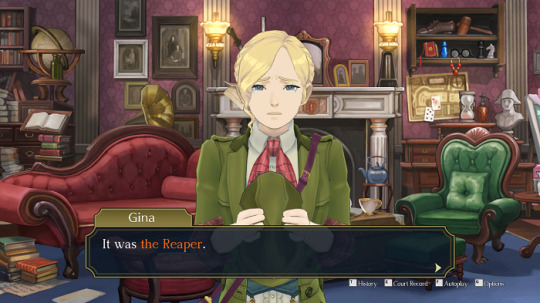
It's true that to the average civilian like Gina, Van Zieks's name is pretty much synonymous to the Reaper (of the Old Bailey). Even so, to have her outright calling him by that title adds a sort of emotional distance that's really striking. Gina explains they caught him at the scene and there were several witnesses, but Ryu thinks to himself that there's no way Van Zieks would have taken Gregson's life. So naturally, we owe it to our good pal Gregson (who actually was just coming around and being nicer to Ryu) to find the truth. Time to go have a talk with Van Zieks in prison!
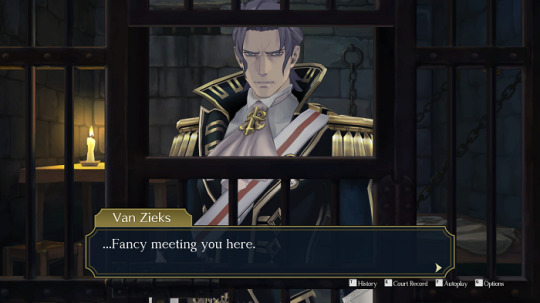
… Okay that's funny. Don't worry, Barok, one day we'll all look back on this and laugh. Anyway, Van Zieks says he's in the last place on earth he'd want to be, with the last person on earth he'd want to see. And this line can easily be misinterpreted as Van Zieks saying he hates Ryu more than anyone else in the world, but what he's actually saying is that Ryu is the last person he wishes would see him in this troublesome situation. Ryu says he couldn't very well not come, but Van Zieks tells him to go home since it has nothing to do with him. Susato interjects, pointing out that Gregson has helped them out on numerous occasions and so, they're indebted to him. She pleads for Van Zieks's help with the investigation and he's silent for a moment, only to say: “There's really nothing I can tell you.” Which I suppose means he doesn't think he has anything helpful to say. Ryu asks about what Van Zieks was reading when they came in and assumes it to be a case report. Van Zieks says the Yard wouldn't share case details with a suspect (keep that one in mind) and explains it's a letter from Albert. Dear Professor Harebrayne has arrived in Germany safely! Ryu notes that Van Zieks usually never minces his words, but they seem to have less bite than usual now. No wonder, really, since he's in prison for the murder of an old friend. Van Zieks asks how much they already know about the case, so the two of them go through the facts and Van Zieks says they're well-informed. He's got nothing to add, because... Well.
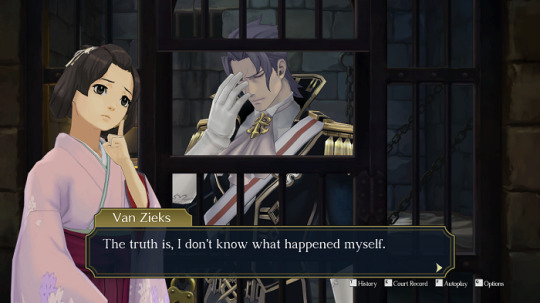
Oh, this is going to be another one of those cases, huh. Susato asks what Van Zieks was doing at the crime scene in the first place, but Van Zieks points out he doesn't need to answer that, as they aren't representing him. When asked who is representing him in court, he says it'd be anyone other than Ryu. That said, he doesn't actually have any representation because of his reputation as the Reaper. Sixteen people he's prosecuted have mysteriously died and now that he's actually been apprehended for a murder, that whole Reaper ordeal is sure to be thoroughly examined.
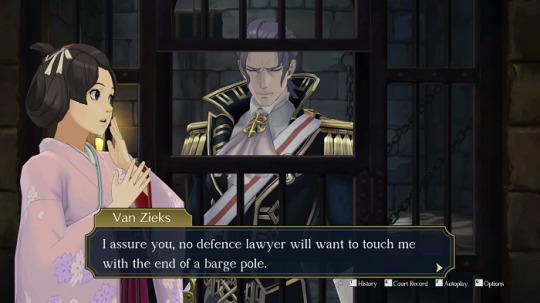
BOY, have we got news for you! When it's pointed out that Van Zieks didn't actually have anything to do with those mysterious deaths (right???), he replies that no one wants to know the true identity of that killer more than he does, but it seems things may come to a head before he can uncover the truth. Van Zieks basically tells Ryu to leave, but being the kind-hearted gentleman that he is, Ryu offers to advocate for him in court. Van Zieks asks whether Ryu trusts him, which is a pretty fair question to ask. He's built up so many racist scumbag points and has such a bad reputation in town, it would be weird for Ryu to trust him unconditionally. Luckily, Ryu has been paying attention just as much as I have; he's heard Van Zieks speak in court and seen the way he treats people (uhh, English citizens, anyway), so he doesn't believe this 'Reaper' has it in him to take a life. Unfortunately, Ryu also has to acknowledge that feelings can't be used as evidence in court. Van Zieks considers the offer gracious, but...
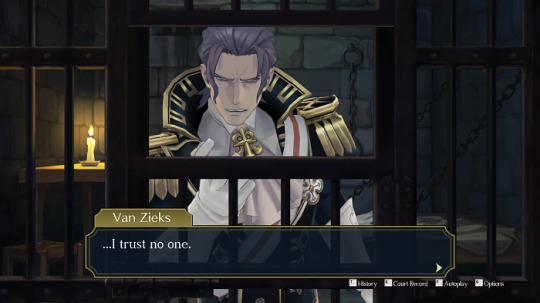
“Not the police, not the judiciary... And not you Nipponese.”
One more scumbag point for putting “you Nipponese” in its own category for no reason. Either way, this man has built up such high defensive walls, you could see them from three galaxies away. Trusting no one is a pretty drastic way of living. Ryu thinks to himself that there's a chasm between the two of them that's 'just too wide and too deep'.
As a sidenote, presenting the attorney armband doesn't lead to any interesting conversation this time, but we can also present the Red-headed League advertisement! Van Zieks surmises that if it were a Black-headed League, Ryu would join without delay, which Ryu then confirms. Van Zieks says that sadly, his hair is neither black nor red. He goes into a most curious identity crisis of sorts, where he looks quite anguished as he wonders which coloured league he should join instead. There have been several debates over his hair color, actually, from lavender to purple to grey. Regardless, Susato points out that “people are troubled by the most unexpected problems at times.” It is unexpected, since Van Zieks needs neither the money nor the company that he would get from joining any such league. It's just the principle of the matter, I suppose.
Over by the crime scene in Fresno Street, Gina gets a little razzled when she suspects Ryu is thinking of defending “that Reaper bloke”. Susato points out that if “Lord van Zieks” really is responsible for the crime, he'll be judged fairly in court. This gets Gina to calm down again, because she really wants to know the truth of what happened and much like Van Zieks, she must know that getting the truth is what Ryu does best. A bit of conversation later, Gina points out one more interesting thing; Gregson apparently held a lot of respect for 'the Reaper'. “I take my hat off to that fella,” were his exact words, apparently. Ryu is skeptical, as am I, because I've seen the way Gregson talks about Van Zieks behind his back.
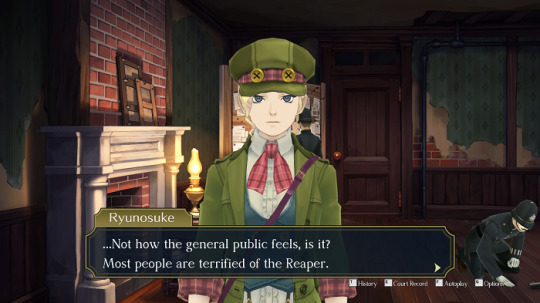
Gina explains that's exactly why he respected Van Zieks. That's... a little weird and ambiguous. So either he respected Van Zieks's ability to stand tall despite all the public scorn, or he respected the fear he struck into people's hearts. There's one more option; Gina keeps talking about the Reaper instead of Van Zieks, so it's possible that Gregson was talking about the actual Reaper. This seems unlikely, though, since he didn't seem to enjoy being part of the Reaper organization.
And now that we know Van Zieks is the defendant, one might be wondering: Who is the prosecutor? Who is the antagonistic force who will try to stop Ryu from uncovering the truth? Well, we find him over in Stronghart's office. Apparently he took an express train back to London from wherever it was he's been these past few days.
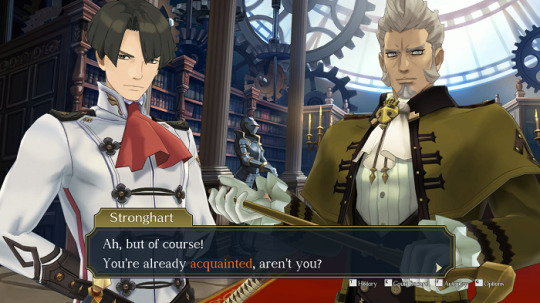
YOOOOUUUU!!! Though before we can address his presence properly, we need to discuss the new case. Stronghart wastes no time asking Ryu and Susato whether they've heard “the sickening news about the Reaper's latest devilry.” Which stands out, to say the least, since Stronghart has always been a strong supporter of Van Zieks up until this point. When Susato points out that surely he doesn't believe it, Stronghart says he believes only in facts, which all point to the unavoidable accusal of Lord van Zieks. Someone sure had a quick turnaround when it comes to his number one prosecutor, geez... Stronghart points out the irony that there's no salvation for anyone prosecuted by the Reaper of the Bailey, and now the Reaper himself must stand in the dock. Just as Van Zieks had already alluded to, Stronghart now claims the public will want answers about those mysterious deaths. Ryu and Susato both point out that which had been rubbed into our faces several times already; Van Zieks denies any involvement, and also there have been several investigations into whether he had anything to do with it. Stronghart kind of brushes this off, though. Turns out, Van Zieks is being traded in for a newer model number one prosecutor: Kazuma Asogi! Which seems weird at first glance, since Kazuma is a defense attorney, but Stronghart considers that a bonus:
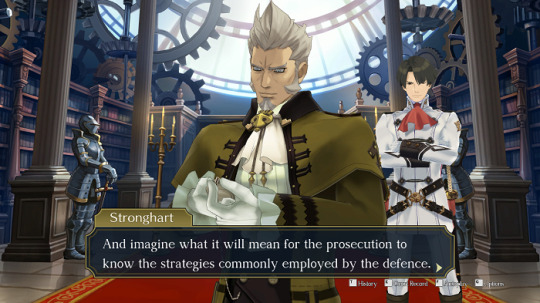
“A devastation combination, wouldn't you agree?”
I do agree. Granted, it seems Van Zieks had already figured out the defense's strategies too, he just never actively used them to his own advantage. It also turns out that Kazuma personally requested the prosecutor position for this trial. Susato thinks it's pretty unprecedented to grant a newcomer exchange student such a request, but Stronghart offers some petty excuse about how this way, it won't look like the judiciary are closing ranks. Kazuma, who assumes his friend will take on the defense, says he'll see how Ryu's skills have been honed after practicing law in England for so many months. (Uhh. Actually, bestie, it was only about two months of being a defense attorney and six months of disbarment.) Ryu notes that Kazuma is being hostile towards him and wonders why. On a final note, when asking Stronghart about the gun found at the crime scene, we're told that it's issued to all members of law enforcement, including prosecutors. Van Zieks claims to have lost his. That's a troubling claim indeed, because it's difficult to prove or disprove. GOSH, if only fingerprints were allowed in court.
As Ryu and Susato turn to leave, Kazuma stops them. He once again states he wants Ryu to witness this trial as the defense counsel, to “see how it ends”. Since Kazuma has a very distinct vision for how he wants it to end, I guess this means he intends to confront Ryu with Van Zieks's guilt and have his bestie see that a man like him is unworthy of his trust. Either that, or he expects Ryu to use this trial to find the truth of what really happened with the Professor ten years ago, just as he used Albert's trial to dig into that incident. Still though, this reads as pretty scummy to me, because it means he wants Ryu to lose a trial and lose some of his belief in his clients. In the trial itself, it seems to me that Kazuma desperately believes Van Zieks to be a horrible person deserving of the guilty verdict. Therefore, he in no way can hold hope that Ryu will prove him wrong (unlike what went down in case 2-3 with Albert). Anyway, Ryu says that Van Zieks would never put his fate in his hands.
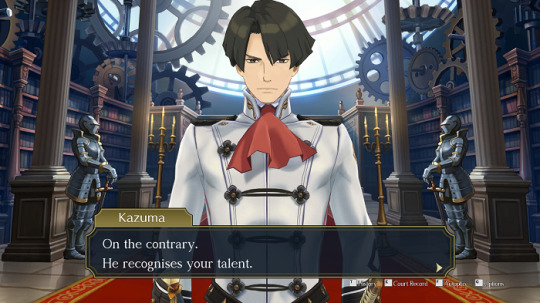
“... It's not easy to see behind the facade sometimes.”
Case 2-3 already told us this, but it's nice to have it confirmed by someone who was closer to Van Zieks. Because remember, Kazuma spent three months by Van Zieks's side (and even fighting by his side), so of course he would know more about his personality than we do. Kazuma hands over a photograph of Barok when he was younger and
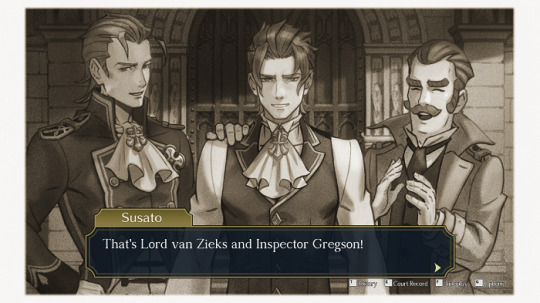
GOOD LORD, HE CAN SMILE. Or he could when he was younger, anyway. Kazuma states the picture was displayed in Gregson's office. What he's 'trying to say' is that if Ryu really thinks he can trust “the Reaper” (distancing choice of words again), he might find that some straight talking will change his view. I got the impression we've been straight talking Van Zieks ever since we first met him, but okay. Let's take the picture and back to the gaol we go! Van Zieks is once again reading from some paper and Ryu points out that either he's an incredibly slow reader or it's an incredibly long letter, but either way, Ryu might even be able to read English faster than him. Naturally, this was said loud enough for Van Zieks to overhear.
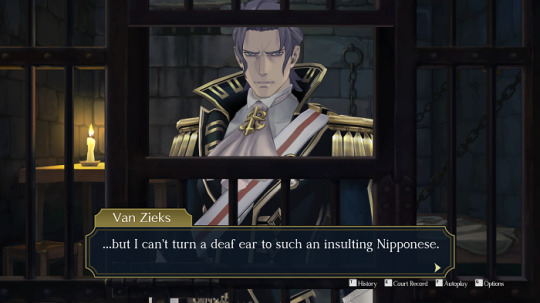
Scumbag point for hypocrisy, but also a scumbag point for “Nipponese”. When Ryu asks whether it's still Albert's letter he's reading, Van Zieks says he had the case report brought to him in secret. So wait, the Yard does share case details with its suspect? Hilarious. Once again, Van Zieks insists the situation has nothing to do with Ryu, up until the prosecutor's name is revealed to him. And so, the masked cardboard cutout student has become the master! Ryu notes that all the color drained from Van Zieks's face, which is pretty impressive when there's barely any color there to begin with. Ryu has the opportunity now to thrust the photograph into his face, so let's do that. He's immediately alarmed, since he assumed it to be lost and would never have expected Gregson to have it. When Ryu says that Gregson had a deep respect for him, he dismisses that as nonsense, only to correct himself. “There was a time things were like that.”
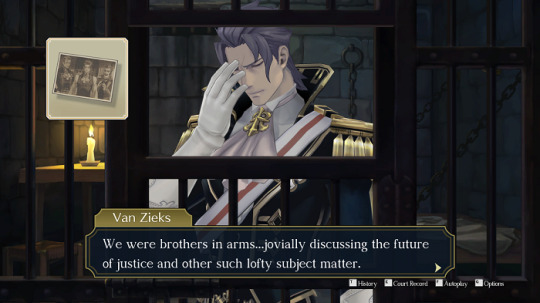
Van Zieks thanks Ryu for that nice glimpse into the past, and Ryu thinks to himself that there was a glimmer in Van Zieks's eyes- a brief twinkle. He considers that “an insight into the true nature of this man known to all as the stone-cold Reaper of the Bailey”, with “the true nature” being highlighted as orange. So this right here is undeniable; this is what the narrative is illustrating to us now. The true nature of Barok van Zieks is that of someone who was hopeful and jovial; kind-hearted, as Albert knew him. What we see now, that harsh exterior full of harsh words, is not his nature at all.
Van Zieks is more willing to talk now. He once again speaks of Klint, rehashing the same story we've heard several times already. Van Zieks claims there's not a single day where he doesn't curse the name Asogi. He considers it a cruel twist of fate that the man's son intends to crucify him in 'some kangaroo court'. Clearly, he doesn't think highly of the upcoming trial if he refers to it as a kangaroo court, but that's likely because he knows he isn't the real killer. When Ryu points out that he still doesn't understand why Stronghart apprenticed Kazuma to Van Zieks, the explanation is that “it's what he does”. Van Zieks believes that Stronghart knew Kazuma's true identity from the outset, but still provides no real explanation as to why Stronghart 'did what he did' and even assigned Kazuma as the prosecutor this time. Van Zieks goes on to contemplate the name Asogi some more and calls it 'the epitome of his bane'.
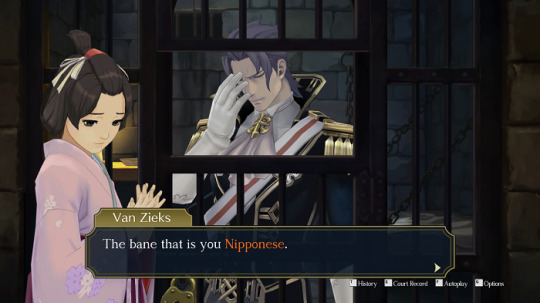
I've talked before about how utterly flawed it is that Van Zieks attributes Genshin's crime to his race and/or cultural upbringing and proceeds to tar every single Japanese person with the same brush. There's no need to go into this again; we all know it's wrong. Turns out, even Van Zieks knows it's wrong, but we'll get back to that momentarily. First, Van Zieks needs to talk about Klint even more. (good lord...) He explains that Klint van Zieks was hunting down a mass murderer and “assigned to the investigation as his partner was a certain visiting student dispatched by the Yard.” This was Genshin, of course, and I believe this is the first time it's said that he too was looking into the Professor case. So Van Zieks already mentioned in the previous case that the Japanese students had left a deep impact on him, and also that he once toasted friendship with a Japanese person, but now we have this:
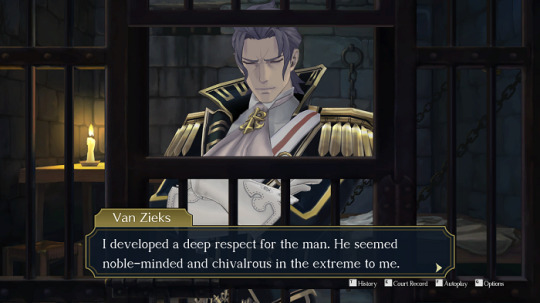
“But none of us saw the true nature of the man.”
True nature is once again in orange here, but this time as a red herring. Van Zieks believes that the Professor murders were Genshin's true nature, when it isn't quite true at all. Regardless, since Van Zieks was still in university at the time the exchange students were in the country, I don't think he would've had that much contact with Genshin. I expect he encountered the man on rare occasion while Klint associated most with him. Every meeting was enough to foster this respect and friendship, though, so it's clear that young Van Zieks was easily influenced and had a very open mind towards a foreign exchange student. But then, that's what makes the next portion of the story all the more damaging.
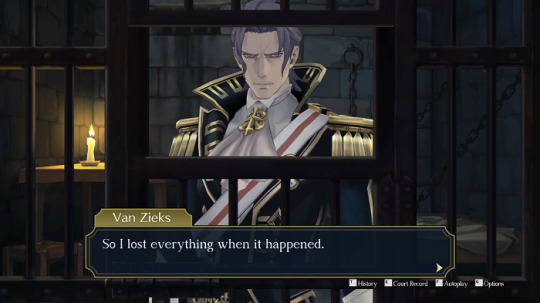
“My esteemed brother... The people I believed in... And any semblance of right prevailing over wrong!”
As Van Zieks also already alluded to in the previous case, he found himself in a very dark place. That isn't surprising. Every positive thing Van Zieks knew in his life, from his family to his closest friends, was ripped away from him in extremely close succession. What must've been the final nail in the coffin was Genshin outright admitting to his crimes. It erased all doubt that perhaps there was some sort of misunderstanding or a frame job. Going over everything Van Zieks has said so far, it seems he didn't just blame Genshin for the tremendous loss he suffered; he blamed himself. He must believe that his trust in Genshin blinded him to this supposed 'true nature', just as it must've also blinded Klint, and that the whole tragedy could've been prevented if only he'd been more cautious. So now, in present day, he no longer trusts anyone. He outright says so.
Van Zieks goes on to talk about how he was the one who prosecuted the Professor. Since he'd only just graduated, such a thing usually wouldn't be allowed, but he “beleaguered the ascribed prosecutor until he consented.” This person was Mael Stronghart, who back then was apparently still no more than a prosecutor. A highly accomplished one, but a prosecutor nonetheless. Since Klint was the Director of Prosecutions (or Chief Prosecutor???) at the time, that means he actually ranked above Stronghart. Interesting. Regardless, since Stronghart agreed to let Van Zieks lead the prosecution and instead only acted as an advisor, Van Zieks now feels indebted to him. That certainly explains why he's usually so good about following Stronghart's orders and not asking questions.
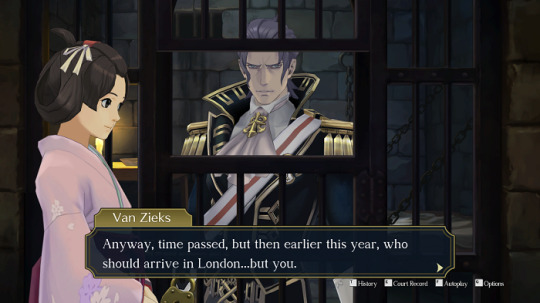
“And, of all things, as a lawyer.”
Ahhh, this is the part where Ryu enters the chronology. Our protagonist points out that he's felt Van Zieks's animosity since the first time he faced him in the courtroom; his obvious deep loathing of Japanese people. And here comes perhaps one of the most important, yet most overlooked lines Van Zieks will ever utter in these games:
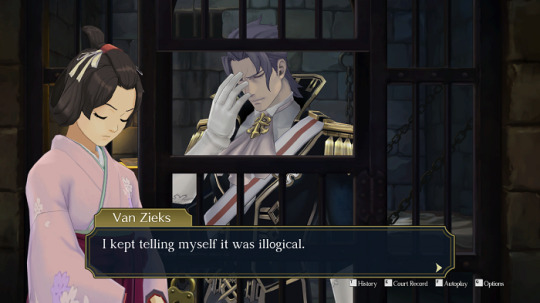
“But for so many years, that hatred had festered inside me, I could no longer control it.”
So here, Van Zieks admits to two things. First of all, he admits that he was wrong to hold such deep loathing and by extension, to give that loathing a voice. He's a man of logic, after all. To cling to something which he refers to as illogical is about as wrong as one could get. Not only that, he admits that this was an unstoppable force he should have controlled, but was too weak to do so. The hatred overpowered him and did away with common sense. He behaved stupidly and irrationally because for ten years, hatred and negativity was all he knew. But what's even more striking here is Ryu's answer, which is also often overlooked:
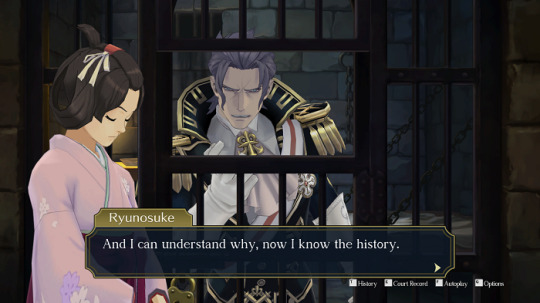
Ryu, bless his heart, doesn't blame Van Zieks for succumbing to this weakness. Bear in mind, he's the victim here. Van Zieks wouldn't have encountered many other Japanese people in those ten years, if at all. This means the first person he lashed out against was Ryu. Naturally, Ryu can't speak for Susato or Soseki, who received their own verbal assaults and might have different opinions on the matter. Ryu is just one man, but in our narrative, he's the main protagonist and the main target of these outbursts. Is it misleading and perhaps even problematic in the grand scheme of things to have the protagonist sympathize with such motivation? Well, that depends on many different factors. There's no easy answer for this because it's a nuanced, cultural sort of thing. Personally, I was a bit bothered by it, but not to the point that it ruined the experience for me.
Van Zieks admits that just as the Japanese were the bane of his life, Kazuma Asogi must believe Van Zieks to be the bane of his. He is, after all, the Reaper who sent his father to the gallows. Van Zieks thinks that Kazuma intends to take revenge in court and... Really, this is true.
There's a quick bit of conversation about Gregson now. Turns out, the only reason the Professor was caught at all was because Gregson forced an autopsy on Klint despite it being considered the highest taboo at the time. Van Zieks says that as a result of Gregson's powerful conviction, he could avenge his brother's death. He looks quite torn, a bit pained. He must believe he owes Gregson something for this. The conversation then moves on to Van Zieks's revolver, which he claims to have misplaced an undetermined amount of time ago. “I must have stowed it somewhere, I suppose. Or left it somewhere, perhaps.” Van Zieks clearly doesn't think highly of firearms as a weapon, since he's constantly carrying a sword around instead. Susato points out that Ryu has a talent for misplacing things in common with Van Zieks, which leads to one more scumbag outburst.
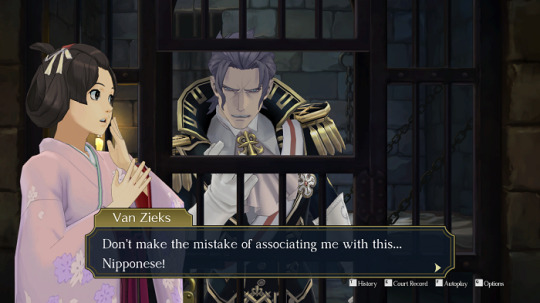
… Dude. Come on. You just admitted it was illogical. You came so far! Scumbag point for you. Still, as the conversation rounds to a close, Van Zieks utters the words “Mister... Naruhodo”, much to Ryu's surprise. This is the first time he's actually said Ryu's name! Van Zieks once again reiterates that he's lost all confidence in England's judiciary system. He doesn't trust the police, the judiciary or lawyers. Even so, there's still one thing he's willing to believe in.
“That which you see in the eyes of another across the courtroom: a simple determination to know the truth. From the very first time we clashed in the Bailey almost a year ago now... I couldn't deny it, even though I dearly wished I could. 'Here is a loathsome Japanese... who has absolute integrity as a lawyer.' There are only two other men I've known with that same look in their eyes: my brother, Klint. … And Genshin Asogi.”
This is interesting. So at first when he saw that look in Ryu's eyes, he must've been reminded of Genshin. And again, this is why he directed such hatred towards Ryu; he saw someone who wasn't alive anymore. But now he recalls that Klint also had that same gaze, and so he wants to believe that Ryu is not similar to a deceitful murderer, he's instead similar to his beloved brother. (Boy is he going to have to reevaluate how he judges people when he finds out that his beloved brother was the deceitful murderer.) Van Zieks says that when he saw the photograph, he was reminded of a time when he could laugh, free of the shackles of mistrust which plague him now. This is very relevant since Van Zieks indeed can't laugh anymore. We never see him do it. He can't even smile.
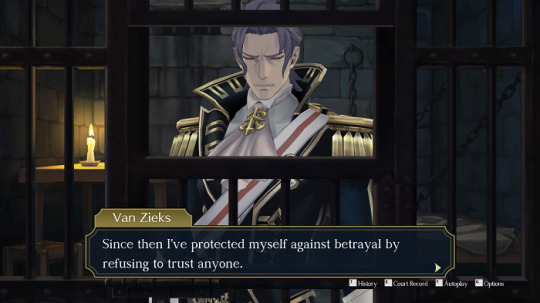
“But at times the mire into which I've sunk makes it almost impossible to breathe.”
Someone please get this man to a professional therapist. If he means that in a more literal sense and he does occasionally feel like he can't breathe, that's telltale signs of panic attacks. It could just be, of course, that he's being overdramatic and the “impossible to breathe” bit is just fanciful wordplay to go with the mire analogy. Still though, considering he's also mentioned being in a dark place and that he's willing to die so long as it serves a useful purpose, and that he drinks his wine to stave off tedium... He's clearly depressed. But then, he seems to know it. He acknowledges that the way he is now is not the way things should be, and that he needs to fight to overcome it. And so:
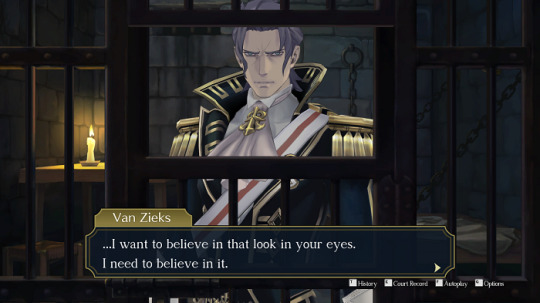
“... In tomorrow's trial... Will you advocate for me?”
Boom. Swallowed his pride and turned to Ryu for help because he knows it's what's best for him. He no longer trusts anyone, but he's willing to trust Ryu because once he starts opening up again and has that trust repaid, then perhaps things can gradually go back to the way things were when he was younger. Mind, he still hasn't apologized for his actions, but that doesn't change that Ryu at least is willing to extend a hand to Van Zieks. It's a little sad that Susato doesn't properly form her own opinion on this and instead just goes along with whatever Ryu says. I would've liked to know just how she feels about Van Zieks's attitude and whether or not he deserves to be helped. She doesn't object to it, at least, and since Susato usually always speaks her mind, I can only assume she genuinely agrees with Ryu's sentiments.
The next day, in the defendant's lobby, it's remarked there's a 'menacing tension' in the air and Ryu surmises out loud it's the result of the menacing appearance of the defendant. Well-deserved, that remark. Touché. Van Zieks asks him for a little more courtesy in a polite enough manner, but considering the lack of courtesy he's shown Ryu over the past 8 months, that's hypocritical. He informs Ryu that this is a closed trial without a jury, which bums me out because it means no more Summation Examination. I would've liked to see Asogi react to that. (S)Holmes comes in and has the weirdest little banter with Van Zieks that I honestly can't... really decipher. There's several things about it that really strike me as being off:
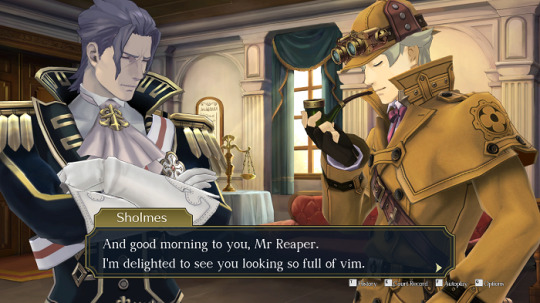
- “And I you. I see London's celebrated great detective is as active as ever.”
- “Oh, you exaggerate, my dear fellow. Compared to my paltry engagements with a few trivial cases... The Reaper's overbearing presence is a far greater deterrent to the black roots of crime in our capital. And whilst I may not agree with your methods... There is at least one point on which I would readily commend you.”
- “What an honour. And that would be...?”
- “Your eye for a good lawyer, sir. […] Behind this lawyer there is a very great mind. My own.”
Alright, so... First of all, we know (S)Holmes is super arrogant and would never refer to his past cases as “trivial” in all sincerity. Plus, it's established that he's very weird with compliments, such as referring to Gregson as “the best of those blunderers of the Yard”, so complimenting Van Zieks directly on the effect he has on crime feels off. Aside from that, (S)Holmes addresses Van Zieks as the Reaper and continues to talk about 'his methods', when it's already been established (S)Holmes doesn't believe Van Zieks has anything to do with the Reaper killings. Taking all that into account, I can only really assume that the first half of this above conversation is (S)Holmes being weirdly passive aggressive towards Van Zieks, with Van Zieks being passive aggressive in turn. It really, truly feels as if there was some sort of backstory between these two that they had to scrap at the last second. Regardless, the exchange ends with (S)Holmes warning Van Zieks that this will be “quite a trial”.
Gina Lestrade shows up with Yujin Mikotoba (….. when did they meet???), saying they intend to watch the trial, and I am very impressed with how (S)Holmes manages to disappear from the scene and not say a word when his old partner arrives. Anyway, Gina looks Ryu square in the eye and asks him why he agreed to take Van Zieks on. Everyone's saying it was him who killed Gregson. Considering everyone was saying it was her who killed Pop Windibank six months ago, you'd think she might want to tone down her attitude, but she's clearly in mourning and lashing out. See? People who are hurting can say insensitive things. Ryu insists he doesn't believe it to be true, but Gina demands to know that if it wasn't him, then who?
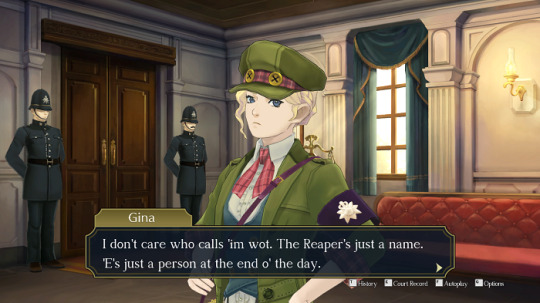
“An' if it turns out it was 'im wot killed the boss... Then God 'elp 'im!”
It's interesting to remember that during The Unspeakable Story, Gina wasn't afraid of Van Zieks for his Reaper reputation. She didn't believe in the curse and didn't think she would end up like the other defendants. Now, she absolutely no longer gives a damn whether Van Zieks is the mysterious Reaper or not. She only thinks he might be a murderer who took away her mentor and that's what has her judge him so fiercely. Van Zieks remarks on her fiery eyes and tells her that the culprit does indeed deserve every inch of her loathing. “At least that may be some solace to the deceased.” So here, in a roundabout way, it rather looks as if Van Zieks is sympathizing with Gina's anger. At the very least, he's condoning it, just not towards himself.
Entering the courtroom, it becomes clear very fast just how serious this trial will become. Just as was alluded to before, the judge confirms that the 'Reaper of the Old Bailey' has been undermining Her Majesty's justice system and therefore, the people will demand answers on this matter. Ryu thinks to himself the trial will be a lot more far-reaching than just Gregson's murder. Sure enough, Kazuma is at the prosecutor's bench and ready to get that vengeance Van Zieks referred to in jail. Shockingly, the first witness he summons is actually Van Zieks himself. The judge is surprised, but Kazuma explains that as a prosecutor, Van Zieks believes in the oath of office he's taken; he'll be compelled to tell the truth. Because contrary to what happened in Memoirs of the Clouded Kokoro, Van Zieks is against perjury! (I WILL NEVER GET OVER WHAT HAPPENED WITH SHAMSPEARE!) Sure enough, he takes the stand and Kazuma says the court would like to hear him explain some things away.
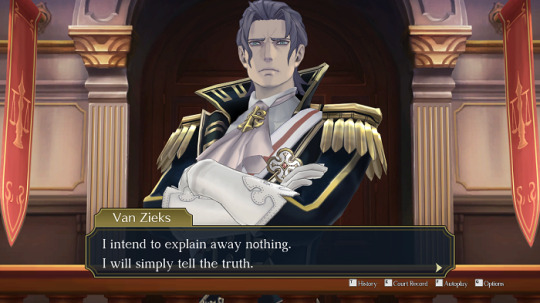
He really is just brutally honest, isn't he? Both in his courtroom methods and in how he shows his emotions. He doesn't sugarcoat, he doesn't beat around the bush, he definitely doesn't lie... At most, he may withhold some information. Unfortunately, his testimony is mostly useless. The judge remarks that he didn't want to imagine this day would come, but ever since Van Zieks became known as the Reaper, he's been dreading it. The judge, our neutral ground, seems to be convinced that Van Zieks may have actually done the deed. That's not good. Kazuma acts all smug, saying that Van Zieks indeed hasn't explained anything away and that his testimony barely qualifies as an excuse. Van Zieks notes that his 'mute apprentice' has a way with words. Meanwhile, Ryu thinks to himself that Kazuma isn't behaving like himself, which is a sentiment they'll keep repeating throughout the case. … I gotta be honest here, I didn't notice all that much of a difference between this Kazuma and the one from the very first case of the game. I mean, come on, he sliced a man's hair off and cursed his descendants just for insulting Ryu. He's slightly more arrogant here, maybe, but since he was only the assistant there and is a leading counsel here, it makes sense for him to be more proactive and confident in his methods. Then again, I'm not a Kazuma expert; maybe there's something I'm missing.
In his testimony, Van Zieks revealed that he was investigating Gregson, but when pressed on it he won't admit the exact reason for it. He only says he'd identified a distinct possibility Gregson was involved in a case he was investigating. When asked how he even knew where Gregson would be, he openly admits to having stolen into his office and consulted his diary. (“Dear Diary, today I dropped my fish 'n chips on the way to Fresno Street-”) When told that illegally entering Gregson's office would warrant serious consequences, Van Zieks says he was aware of that risk.
The rest of the testimony is pressed without further hitches, though what did strike me as interesting is that at one point, Ryu suggests the gunshot might've originated from outside the room, but Van Zieks immediately says it's out of the question. He shoots the possibility down with evidence only he could have experienced (the bang sounded inside the room and he could smell gunpowder), and in doing so, only implicates himself further. Detrimentally honest, this one. Not only that, but he picked the gun up.
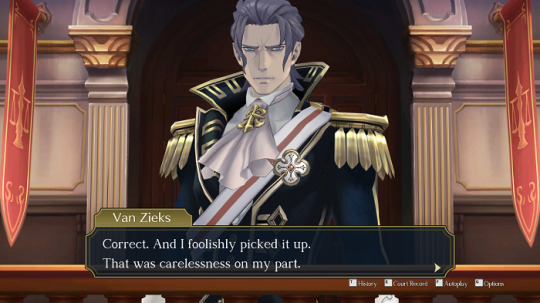
NO KIDDING that was carelessness. Is he related to Miles Edgeworth after all? Kazuma talks about how three street peddlers overheard the bang and burst through the door with some force. Van Zieks states they almost gave him a heart attack in the process (omg) and Ryu thinks to himself: “(But you're supposed to be the Reaper...)” C'mon Ryu, haven't you seen enough of this man by now to know he gets jarred easily?
When the testimony rounds to a close, things get interesting. Kazuma uses his defense attorney skills, as promised. He uses evidence from the Court Record to point out contradictions in Van Zieks's testimony, thereby 'proving he's lying'. Hey, what happened to Van Zieks believing in the oath of office and being compelled to tell the truth? Did Kazuma call Van Zieks to the stand just to expose him as a liar? He wins the judge over quite easily by illustrating these contradictions and casting doubt on Van Zieks's integrity. Tragic, because as Van Zieks says:
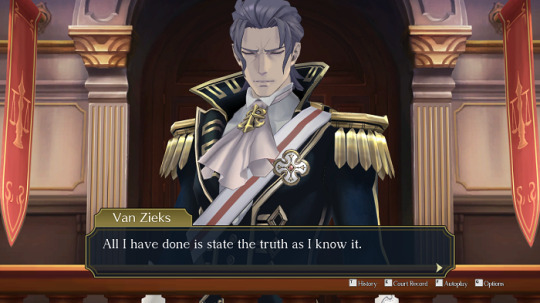
Van Zieks steps down from the stand and disappears for the remainder of the trial day. He doesn't even show up during intermission in the defendant's lobby. Characters do still talk about him, though!
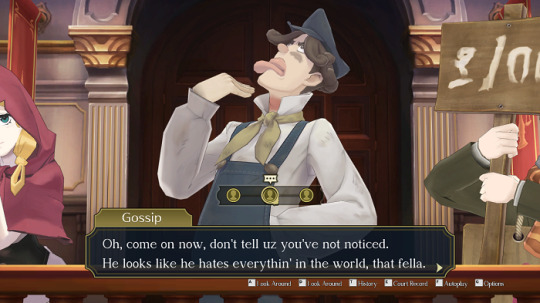
I mean... He ain't lyin'. At one point, Kazuma utters the words “the defence is fated to lose. And the prosecution to win,” which once again confirms that Kazuma basically asked Ryu to take part in an 'unwinnable' trial. Which, y'know, is technically fine. Losing a trial isn't the end of the world, especially when the defendant (in Kazuma's eyes) is actually guilty. Still though, personally asking Ryu to take on Van Zieks just so he can watch the man be exposed as a killer is kind of... Kazuma, sir, are you also unable to control your hatred and having it lash out in illogical ways? Is that a parallel with Van Zieks I spy?
The rest of the trial isn't directly related to Van Zieks. It's just a whole bunch of roundabout arguing with street peddlers, red-headed scammers and the revelation that one of those peddlers is actually Daley Vigil, the missing former prison warder. Despite knowing of the dangers, Kazuma asks Ryu to help him forcefully break some of the man's black psyche-locks (c'mon, we all know that's what's impeding his memories) and they send the man to the hospital as a result. Welp. Unveiling the truth is becoming increasingly dangerous in this game and that's really upping the stakes for us.
Into the next investigation day we go! Ryu surmises that it's clear now “Van Zieks definitely didn't do it.” Even so, there are some unanswered questions about the man. What was he even doing at the crime scene and what's with that investigation into Gregson he didn't want to talk about in court? Heading on over to the Chief Justice's office, we overhear him pressuring Kazuma into 'continuing the trial as instructed'. Once he takes note of Ryu and the others, he tells them that he wanted Van Zieks's trial concluded that day and blames 'Asogi's unwelcome inquiries' for it taking longer than necessary. Stronghart's becoming increasingly ominous, here... I don't know for certain why he doesn't just go the extra mile to have Van Zieks proven innocent so he can keep using his Reaper tool to intimidate the masses. I suppose it's because with Gregson dead, he's lost his most important strategist in the killings and the tool of the Reaper's curse can't be used as easily anymore. Assassins probably come a dime a dozen, so Shinn can be replaced, but Gregson... Not so much. Ryu asks Stronghart whether Kazuma truly believes Van Zieks to be the Reaper, but Stronghart says he wouldn't know. He once again talks about the history of the Reaper with its very long run of coincidental deaths and tells us nothing new or interesting.
To prison we go, to visit Van Zieks himself! He's reading a book now, but we're never told what it is. He tries to ignore the visitors, but just as always, eventually comes up to the bars to talk.
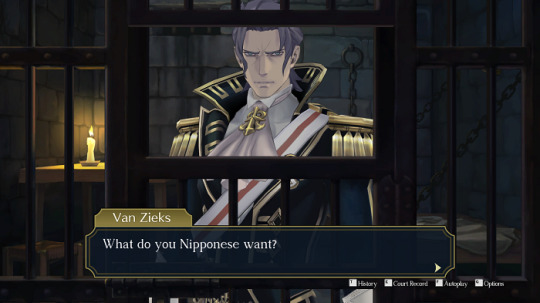
YOU FREAKIN- I CAN'T- WHY- How many more times must we teach you this lesson, old man?!!! Thankfully, even Ryu is fed up at this point.
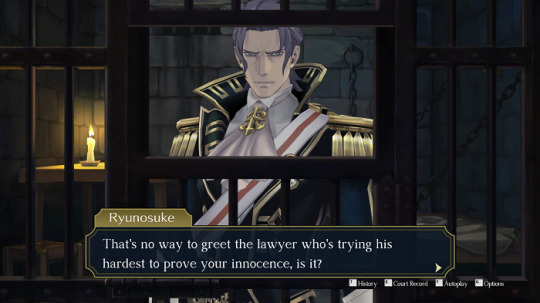
Finally. He spoke up. I've seen a lot of people criticize the fact that Ryu never properly confronts Van Zieks with the damage he's been doing, and on the one hand I would agree. Calling people out on their bullshit is a very useful step in having them notice their mistakes. However, I'd be remiss if I didn't point out that is also a very Western view. It's very easy for us to think that Ryu should stand up for himself and call Van Zieks a prejudiced little tosser who needs to think before he speaks, but that simply isn't part of his character. There may be several reasons to explain why he doesn't confront Van Zieks more firmly, but I'd like to focus on just two. The first is that Ryu is an exchange student who came to England as a 'guest' and is facing not just one racist. Not even five or ten. Everywhere he goes, he's surrounded by people just like Van Zieks. We've seen it in the judge, we've seen it in the jurors, we've seen it in Gregson and in witnesses... Ryu is a minority in a very literal sense, since there's only one other Japanese person (two if we count Soseki) we know of in this entire city. There's a very natural, very understandable defense mechanism which may kick in when surrounded by potentially dangerous individuals, and that is to withdraw; to be as quiet as possible and to attract as little trouble as possible, since 'they outnumber you'. Bonus points for the extreme difference in social standing between Ryu and Van Zieks.
There's one other thing which adds to the above. Ryu was written to be your everyday Japanese person, and their view on confrontation is quite different from our own. I remembered this from a job interview I once had with a Japanese company and looked into it again to refresh my memory: Japanese people are non-confrontational. It's very important for them to maintain a sort of harmony during conversation and therefore, they'll rarely utter negative sentiments, such as criticism, in a way that will cause embarrassment to the person they're addressing. Instead, they employ something often referred to as indirect communication. “The pattern of Japanese indirect communication uses far less words to convey intent in a more subtle manner. Indirect communication uses expression, posture, and tone of voice of the speaker to draw meaning from the actual conversation.” This is very deeply ingrained into the Japanese culture and, if the sources I reviewed are correct, it goes all the way back to the feudal days. Mind, this attitude isn't even limited to Japan. I've been told there's several other countries who adopt that very same attitude and if you cause someone else to lose face, it can have some very severe repercussions for you. Kazuma is a bit more outspoken than Ryu, for example when they face Jezail, but this makes sense also, since Asogi was written to be more progressive. It seems to me that Ryu has been using indirect communication quite often already and, since Van Zieks is woefully unequipped to read this type of communication, Ryu has now finally resorted to something more direct. It's still not a sharp call-out, but rather, the above line reads to me as something in-between direct and indirect communication. And it works.
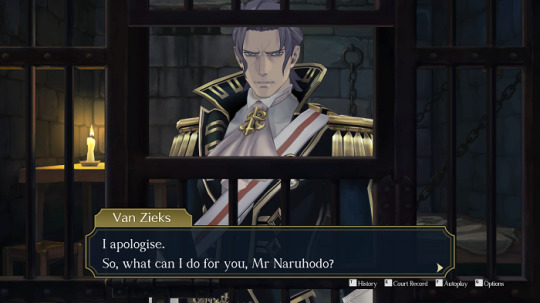
HELL FROZE OVER! We've done it, lads! Or, as Iris puts it:
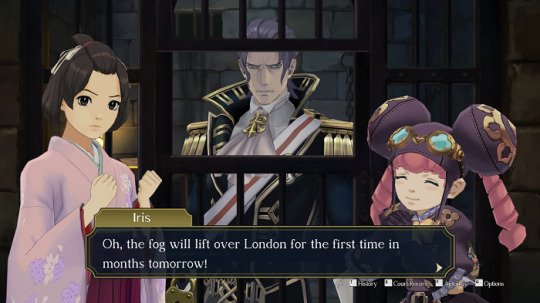
So even the rest of the cast is acknowledging this is a big deal and we've made tremendous progress. Could someone else have confronted Van Zieks in a more direct, more Western way before this point? Sure. But would he have listened? The judge has already snarked at him several times during trials and it's always been brushed off as nothing. The only person he might've listened to would've been Albert, but what is the narrative significance of having a side character confront Van Zieks? There isn't one. This was a very impactful moment where Ryu himself resorted to a more Western tactic to get his point across and Van Zieks, in turn, finally uttered an apology. So now we get to have an earnest conversation with the man at last. Van Zieks says he was impressed; not by Ryu but by Kazuma. On first glance, this seems like a mean thing to say, but... Van Zieks is already intimately familiar with Ryu's performance in the courtroom. Why would he still be impressed by that? Kazuma, however, he's never seen in action before. Van Zieks thinks it's all rather “sardonic”.
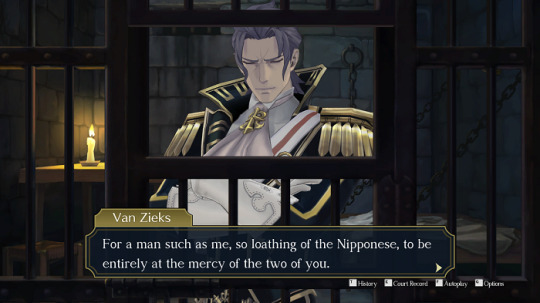
It's called a cruel irony, Barok. A common tool in storytelling. He himself considers it “retribution for having played the part of the Reaper all these years”. So once again it's discussed how the Reaper minimizes the amount of crime in the capital and since that's a goal Van Zieks is committed to, he never said anything to disprove the rumors. Ryu insists that someone else is profiting off Van Zieks's silence on the matter and is basically using him as a scapegoat. As it turns out, Van Zieks wasn't quite as passive about the matter as he's led us to believe.
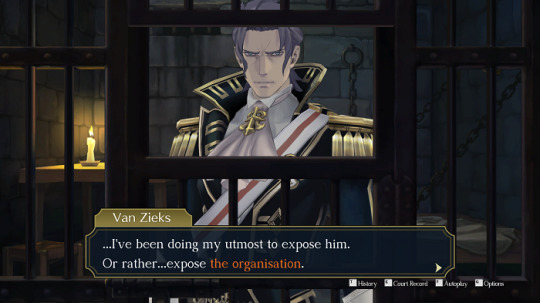
Hm. Alright, so he thinks it's good the Reaper's curse is reducing crime in London, but clearly he wants the Reaper organization brought to justice. In a way, he's profiting off these 'accidental deaths' since the fear that comes from them aligns with his goal of crime reduction, but he doesn't actively condone the Reaper murders and wants them halted. Since there's so much accurate information about the accused used in the killings, Van Zieks surmised a while ago that someone from Scotland Yard must've been involved in the killings. It's taken him “many years” to identify the central figure in the organization: Tobias Gregson. Naturally, everyone is shocked. We knew Gregson! And sure, he wasn't exactly a kind person, but he certainly didn't appear to be a killer. He was very rough around the edges, but from what we'd been led to believe, he had a good heart. … A decent heart. Mediocre, one might say. Ryu asks whether the reason Van Zieks was investigating Gregson was to expose him as the Reaper, but Van Zieks repeats the notion that the Reaper is not a single person. He doesn't have a doubt, though, that Gregson was a key member of the organization who did all of the planning. Believe it or not, Gregson was the brains behind the killings; the tactician who investigated and plotted, then left the dirty work to an assassin by the name of Asa Shinn. (LOCALIZATION WHY)
So now that we have this information, we can come to a very interesting conclusion. Both Gregson and Shinn are dead now, so by Van Zieks's reasoning, the Reaper is dead. You'd think this is good, but it does in fact make it very difficult to find the truth. Rather, Van Zieks believes that the truth died with Gregson (he hinted as much twice already) and while the seasoned Ace Attorney player knows it won't be impossible to expose a dead person as a killer, it'd be a hectic ordeal. The seasoned Great Ace Attorney player will know the Reaper hierarchy extends just a bit higher and the two who died are only pawns, but... Y'know. Approaching this from a first-time-player point of view, you'll know things will get troublesome.
There's another topic of conversation where Van Zieks once again addresses how sharp Kazuma is in court. He didn't miss a thing.
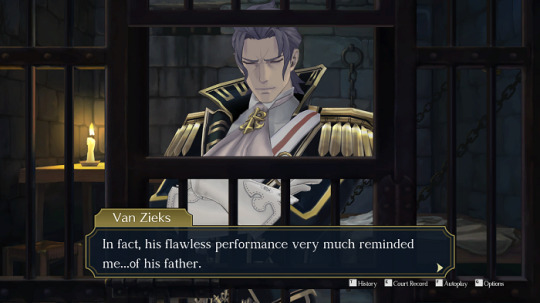
OUCH. So when Ryu first arrived, Van Zieks saw Genshin whenever he looked at him, not only due to his roots but due to 'the look in his eyes when searching for the truth'. Now, he sees Genshin in Kazuma, which surely makes a lot more sense. Van Zieks goes on to say that it's true some of the aristocracy from 10 years ago were problematic and abusing their power. “In a way, Asogi was carving out a canker from society that we British couldn't deal with ourselves.” So here, he sounds almost complimentary of the Professor's actions- specifically Asogi's actions. As if it would've all been well and good, were it not for the Professor's final victim. “But that's precisely why it makes no sense. Klint van Zieks was a noble and upstanding man. He wasn't corrupt.”
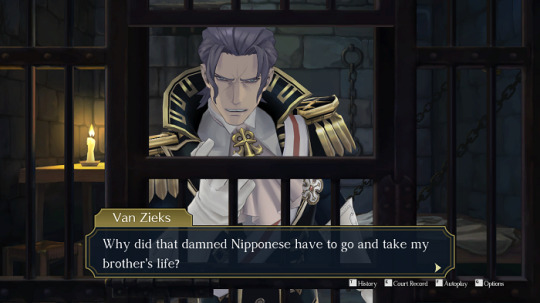
Remember way back in The Unspeakable Story when I surmised that Van Zieks boiled Genshin's actions down to his race in order to avoid the belief that there might've been a reason his brother was killed? We see it here again. Van Zieks is in doubt. He may say vocally that “it makes no sense”, but that line in itself is already telling. The fact that he acknowledges it and draws it into question implies to us that he's skeptical of the story. Deep down, he knows something is amiss. He knows there's some sort of explanation he's missing, but if he were to dig too deeply into it, he'd have to acknowledge that perhaps his brother was corrupt. And this still isn't all of it. There's one more thing Van Zieks has to discuss before we can round this conversation to a close. Ten years ago, shortly after Klint died, Genshin saved his life.
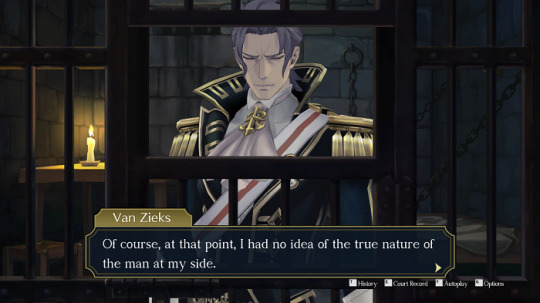
There's that phrasing again. “True nature”. It's not in orange this time, but it's there all the same. Van Zieks is convinced that Genshin is the one who had a hidden true nature. In this story, we learn that 'the scum of London' had already targeted him several times even before he became known as the Reaper, simply because of who he was and who his brother was. JEESH. Harsh. So on the night in question, a couple of thugs also tried to kill him (allegedly) but Genshin stepped in to protect him. Genshin became lightly wounded as a result. This is the part where I would have expected them to explain Van Zieks's scars, but he never mentions being wounded himself, so we can't be sure this is when it happened. Curious. This was the perfect opportunity and they let it slide. So anyway, two days after that incident, Genshin was arrested.
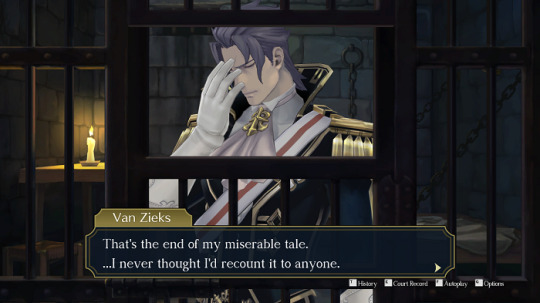
Some more telling lines here. Van Zieks thinks he'd never recount the story to anyone; not because there's no need to tell it. It's because it must be difficult to talk about. On its own, that might be a farfetched conclusion I wouldn't make, but Ryu confirms it with his follow-up line: “Thank you... for confiding in me.” We can take this line to mean exactly what it says; Van Zieks confided something painful. He let down some more walls. Growth!
So with all this out of the way, there's a whole load more investigation to do before this case is over. Most of it has to do with Genshin's will, a mysterious trunk belonging to Gregson, the missing time of death on the autopsy report... Nothing too relevant to Van Zieks's character. However, if we go into the prosecutor's office and examine things while Kazuma is there, we do get some fun tidbits about how Van Zieks wouldn't trust anyone else to touch his things and would rearrange it all himself whenever needed. From the sound of it, Van Zieks is very meticulous and a loner, which aligns with what we know about him. Some more conversation later, we reach the topic of the Reaper with Kazuma. He agrees that Gregson was definitely involved in the Reaper organization, but there's one thing that's more important. “Who's been giving orders to the Inspector?” In my eyes, it's a bit of a stretch to assume with certainty anyone was giving orders; Gregson might've just taken up the vigilante justice by himself and found some way to pay Shinn enough money to get in on it. Kazuma insists, though, that Van Zieks is 'the real Reaper'. We as the audience already know that's nonsense, we know Kazuma is wrong. Or perhaps we might think that if somehow Van Zieks pulled the wool over our eyes and Kazuma is correct, that'd be one heck of a wild twist. Kazuma gives no real reason why he believes this, he only goes on to say that ten years ago, it was Van Zieks who 'decided his father must be a mass murderer'. Shockingly, Susato is the one to jump in here and outright say to Kazuma that he's wrong; that Van Zieks only saw that 'justice was done as the law dictates' and he wasn't to blame for Genshin's execution. Kazuma insists that people condemn people and the law is just a tool they use for it. So I suppose that's exactly what he's doing right now. He's condemning Van Zieks, just as Van Zieks once condemned Genshin. We're cycling! And my main question now is this: If Stronghart had been the prosecutor in the Professor's trial instead, would Kazuma be just as vengeful towards him? Because remember, it's people who condemn people. This implies that anyone who had taken on the job of prosecutor at that time is the one who 'decided that Genshin must've been a murderer' and would need to take responsibility in Kazuma's eyes. Kazuma's beef isn't with Van Zieks personally, it's with the prosecutor who used that tool of the law and also evidence.
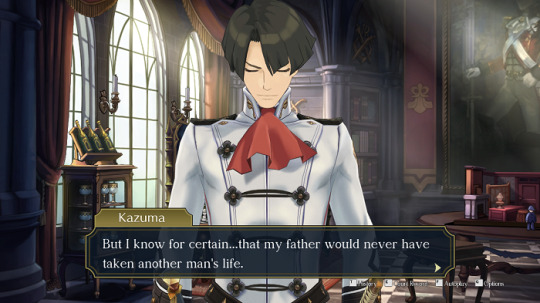
HAHAHAAA! HAH! If you align this screenshot next to the “Klint van Zieks was a noble and upstanding man” line, you get a wonderful parallel. These two prosecutors are both dead wrong about their beloved family, and they're about to find out in the worst way possible.
One murder mystery spread out over two episodes? You bet! Stay tuned for the last case, The Resolve of Ryunosuke Naruhodo!
#dgs#dgs spoilers#tgaa#tgaa spoilers#barok van zieks#I can't believe I managed to cram it all into one post#phew#but this was a big one
36 notes
·
View notes
Text
The Pelle/Dani Receipts, Post Twelve: Runes
Big, huge Hårga hugs and thanks again to @daydreamers for expertise and editing on this post!
So. Runes. Specifically, the Elder Futhark runes, as Pelle tells Dani in the Director’s Cut, the “special little language” of the Hårgans. Throughout the film, runes are insinuated into basically every surface of Hårga and its people. So many tattoo opportunities, y’all. And it doesn’t even technically start in Sweden. Ari stuck a board featuring the whole Elder Futhark alphabet in Christian and Mark’s apartment. You can see it on the bookcase to Pelle’s right in the couch scenes. So, the film’s usage of the Elder Futhark is a deep, deep rabbit hole full of all the multivalent subtext we crave from this film, but they’re also absolutely blaring evidence for the Dani/Pelle ship. Throughout the film, like many of the background details we’ve discussed, the runes serve as a repetitive chorus of their fatedness for each other, but better still, the runes footnote the film’s ambiguous resolution as their genuine happy ending. So let’s dig in.
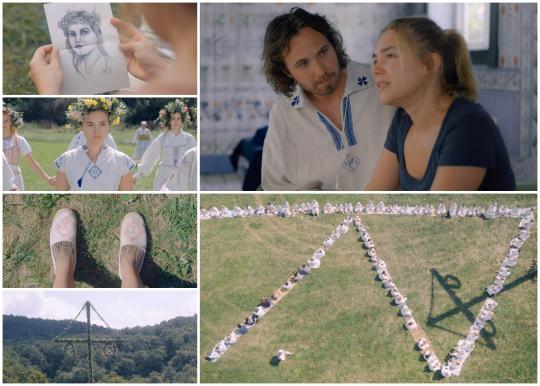
Dani has two main runes associated with her, Raidho and Dagaz, and they are both merkstave versions, that is backwards, lending them a negative reading. Oooooh, scary. Except negative readings aren’t necessarily negative either. All runic readings are subjective and contextual, which is why we decided to talk about these last. Let’s not forget that Dani begins the movie at the bottom of an emotional well.
Raidho, literally ride or wheel, refers to a journey. Yeah, Dani’s on one of those, seems legit. This is the only rune that Ari takes care to point out the meaning of within the film itself, when the elder Arne shows the Rubi Radr to Josh, pointing to Raidho on its side and telling him that that one stands for grief. Grief is a legitimate reading of Raidho merkstave, so let’s just take that interpretation at Arne’s word and combine it with Dagaz, Dani’s second rune.
Dagaz is the last rune in the Elder Futhark, and it means day, symbolizing accomplishment, fulfillment, and new beginnings. As a symmetrical rune, it’s questionable whether it can be merkstave, but Dani’s Dagaz rune (technically runes, as she also has them on her shoes) does lie in opposition. Its negative reading in that case would be hopelessness, blindness, or cataclysmic change. Not fairytale stuff, right?
But Raidho and Dagaz appear together on Pelle’s drawing and on Dani’s dress. Also note that runic inscriptions are read right to left, and the tapestry of the “little love story” is an in-film clue to that reading order. With that in mind, together Raidho merkstave and Dagaz merkstave tell of a big change, even an ending, yes, but an ending to Dani’s grief, and that is what her journey in this film describes. Here, two “negative” readings equal out to a positive in the sense of Dani’s ultimate growth and transcendence. But wait, there’s more.
You will notice the runes on the Hårgans’ clothing, of course, as though they are their personal cult cutie marks, but the embroidered runes are often surrounded by other symbols, esoteric symbols and more complex runic talismans, which deepen the reading of the central rune, like footnotes. In Dani’s dress example, Raidho and Dagaz are flanked by merkstaved Tiwaz runes, with sun symbols above and below. Tiwaz (literally “the god Tyr,” the god of law and justice) is one of the runes featured on Christian’s robe during the sex ritual, and it describes justice, honor, authority, self-sacrifice. Its merkstave meaning then reads as conflict, imbalance, lack of communication...separation. And so, in the specific context of the dance competition, while Dani’s main runes shown in Pelle’s drawing forecast (or possibly straight-up spellcast, depending on your interpretation) an end to her grief, the more complex version she wears for the dance tells of that happening through a conflict and a break...but the sun will come out tomorrow, tomorrow. It is a new dawn for Dani as the May Queen.
Her shoes, which we only see during the dance, are more complicated. First, the embroidery is done in faded red thread, and we know that red appears very selectively on Hårgan garments. Siv wears a ton of red throughout the festival. Maja and Inga also wear striking red additions to their costumes at the Fire Temple ceremony. Ingemar has a single red button on his waistcoat. So red may convey authority, fertility, sacrifice, or even be a brand of shame, but it always seems to mean something.
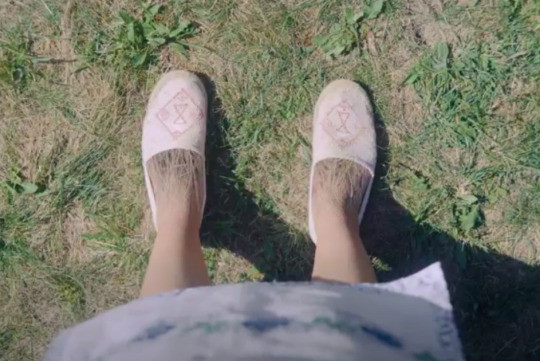
As for the symbols on her shoes, again we see the merkstave-ish Dagaz rune, but it is alone in the center, no Raidho. So we’re looking at a big change or an ending again. Instead of suns, we have snowflakes, recalling the Spoiler Tapestry in the beginning, the way it began in frosty dark death skullhead weather and ends in summer dinner and dancing beneath the scariest sun since Teletubbies. To the right, we have a bind of three Tiwaz runes, and to the left, we have an Ingwaz (seed) rune, combined with a merkstave Kenaz. The triple Tiwaz is a victory rune, taken from an Old Norse poem where a Valkyrie was woken from her slumber. Three is a holy number, and that’s definitely something we know the 9-multiple-loving Hårgans pay attention to. This rune means the sleeper Dani is about to be awoken through a victory. Meanwhile the Ingwaz rune refers to coming into harmony and reaching potential. It’s also a fertility rune. Kenaz (torch) is a rune that normally describes transformation, knowledge, and the harnessing of light; merkstave, it speaks to darkness, lack of illumination and a relationship breakdown. Taken together, reading right to left, Dani’s shoes basically say: there will be a great change where she will be awoken from her slumber through a victory, she will have a breakup and/or her illusions will be shattered, but that will bring her ultimately into harmony, and there is the added implication of her fertility, bolstered by the red thread, being part of this. THAT IS ON HER SHOES.
For what it’s worth, you will also notice Hanna wearing Dagaz in opposition, like Dani, and the elder Sten wears a merkstave Raidho, in yellow no less. You can peep merkstave Raidho and Dagaz elements on the temple doors, too. So even if you eschew our deep dive here, these runes cannot be looked at superficially, as merkstave = bad = Dani doom. If Dani’s doomed, so is Sten and Hanna and the whole damn Hårga, and you may think that, but it’s not terribly likely they’d write it on themselves, is it? Sten doesn’t look doomed to us. Sten looks quite jolly, actually.
OK, time to obsess on Pelle. Pelle has one rune on his Hårgan tunic that he wears for the majority of the film, Fehu, and this seems more straightforward. Fehu means wealth, specifically mobile wealth, specifically cattle. As we mentioned earlier: moo, Dani; moo, sacrifices. And since Pelle’s the one bringing new blood and their new queen, the association of Pelle with prosperity is quite fitting. Add to that the way Fehu and Raidho tend to pop up all over the village, particularly on the maypole. The maypole combination of Raidho (not merkstave) and Fehu speaks to the way the Hårgans believe the dance around the maypole enacts (and reenacts) a ceremony that brings them prosperity, and having Dani and Pelle as Raidho Barbie and Fehu Ken is just kind of perfect in that light.
Pelle’s Fehu is surrounded by four symbols. Let’s have a crack at those, too. First we have what looks like a closed eye up top. At the bottom, we have a cross. The cross is not actually a cross; it’s a combination of four Isa (ice) runes, and we know this because there are four dots arranged around them, telling us, hey, these are four symbols not one. Then to the right, we have another talisman that looks like a crucified diamond with five dots. Again, the dots mean that these are individual runes drawn as one symbol as a kind of shorthand, so this symbol is actually Ingwaz again, quartered by four Isa runes. Finally, to the left, there is another Isa rune crossing a Tiwaz, and the absence of dots here means that they are a bind, or they are meant to be read as one thing (or are a spell for one thing).
The closed eye symbol is a bit of a guess here; it might represent Pelle’s unclouded intuition or maybe, in view of Dani’s suns and the association of Raidho with the summer solstice, it is meant to symbolize Fehu’s complementary association with the winter solstice. We prefer the association with his intuition given the events of the film. But what about the other symbols? Isa is a rune that describes the self or the ego. On the positive side, it is about will and focus, but on the other side, it is everything bad about ice: rigidity, blindness and self-preoccupation, being frozen. Again, symmetrical runes like Isa don’t merkstave, but they can lie in opposition, and so we have two pairs of Isa indicating, at the right, self-fulfillment, with the added implication of fertility, and coming into unity with the family after the will breaks through the metaphorical ice. At the bottom it is the same reading, only without Ingwaz. Will and self-control overcomes lassitude. And then again, one last time, Tiwaz crossed with Isa, read as one thing, not a series like the previous shorthand symbols, invoking justice and male energy to, again, break through the metaphorical ice. Taken together, it’s a formula for Pelle and the family’s triumph. Governed by his unclouded intuition, Pelle’s will overcomes that of his four differently-blind friends, bringing new blood and justice and unity with the family for the betterment of all, and the two breaks in the rightmost configuration carry the added implication of Pelle bringing into the family Christian’s and Dani’s new blood.
Finally, as discussed briefly in posts 10 and 11, Pelle changes his shirt on the morning of the dance competition, swapping Fehu for Wunjo (joy). There do appear to be a couple flanking symbols on this shirt, too, but we never get close enough to see, so we’ll just have to go with Wunjo’s face value. Again, this is the rune that emphasizes harmony, family, and the art of correct wishing, i.e. wanting (and getting) what is good for you. Pelle wearing Wunjo when he kisses Dani is a sign that he, the anti-Christian if you will, is her wish come true. This choice is not only incredibly positive for his relationship with Dani, but illustrative that there is a difference between Dani/Pelle and Dani/Hårga by virtue of the fact that he changes back into the Fehu shirt for the Fire Temple ceremony. Insofar as Dani is part of the family after the ceremony, the prosperity spelled on his Fehu-emblazoned tunic applies to her, too, but the Wunjo shirt is for her and for her victory...and his victory over Christian for her sake. The implication is that their story will not simply end with Dani assimilated into Hårga. They have special, personal significance for each other. While the ending shots of the film are a little ambiguous, the runes promise the May Queen and her consort are going to be just fine, y’all.
Again, would you like to see our fanfics?
Of course, there’s tons more to explore in the film that doesn’t speak specifically to Dani and Pelle’s love story, and even while we compiled this list, we were continually noticing and discovering the significance of new things. There’s no reason to think that will stop just because we’ve posted the Receipts. Still, we hope that you will enjoy the evidence we have compiled here for not only the legitimacy of the Dani/Pelle ship, but its promise of a happy ending for the OTP because, by Ari’s own admission, for better or worse, Midsommar is a wish fulfillment fantasy.
For more, click on The Pelle/Dani Receipts Masterpost
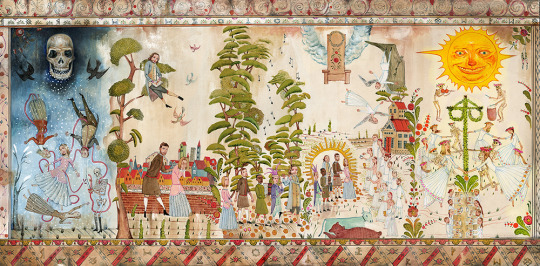
189 notes
·
View notes
Text
Sarazanmai Hot Takes and What it Means for a Character to Be Likeable
Lol I knew the episode 8 fallout would be intense but rather than mind my own business, I’ve decided to help stir the pot
I’ve only watched Revolutionary Girl Utena but I’ve read up on Ikuhara’s other shows and in comparison Sarazanmai comes off as much lighter and more straight-forward in my opinion, yes a kid got shot in the last episode but the core conflicts and real meat of the show has stayed grounded in its slice of life elements, depending on how the climax plays out we might get more ambiguity or higher stakes, but the kappa stuff has always served as a potential solution to the boys’ problems and I could see a lot of the same conflicts and arcs taking place in a completely realistic setting
All of that is to say that despite this I find it harder to really root for and love the characters than expected, it’s not even because I really dislike anyone but because that more grounded setting complicates matters
For example, Enta is probably one of the most controversial characters in the show and he has the most realistic problem, having a crush on a close friend, there have been discussions back and forth about how selfish and overstepping of boundaries he can get but also about how he is just a dumb kid still learning to cope with these feelings, but like few acknowledgements that both sides can be true?
And I feel like the reason is, Enta’s situation is so universal people can either see themselves in his behavior, or people who have really hurt them in it, a lot of people have been the third wheel feeling as if they do everything for others who don’t acknowledge their work, but a lot of people have also had jealous friends who resent your outside relationships and/or sabotage them, like while it is a hot debate on tumblr now on whether it is ok to like terrible, problematic characters or not (spoiler alert it is) people don’t bring up the flip side that a character can have their actions be understandable and at their core they can be well-intentioned yet you can still dislike them
Ikuhara’s work is all about not being able to reduce people to good and bad, that what matters the most is people’s active decision to help one another and try and make the world a place that is just a little bit brighter, so anyone trying to neatly organize this love triangle into heroes and villains by saying X is a good boy and Y is murking up things, is just clearly missing the big picture
Because hot take, the boys’ relationship falling apart is less the result of one instigator and more the culmination of all their flaws making the situation worse and worse
However I still come back to earlier statement of having trouble connecting (lol) 8 was probably my fave Sarazanmai episode so far but I still have yet to be too emotionally compromised or in love with a particular character, I think they’re all solid and well-written, but the closest that I would say I get the most excited to see is well Sara
And the answers to that is people are shallow individuals, myself included. Likabelity has nothing to do with a characters’ morality or complexity but more about what they offer the viewer, sometimes a viewer will be drawn in by that morality or complexity, but it can easily be anything else
Like for the reason Sara is the closest to my fave is bc I’m really fond of that one shot of her in the op, her design is the most interesting plus I just tend be drawn more to female characters, and I’m curious about how she factors into the larger plot, looking at the fandom as a whole, the Otter Cops are by far the most popular characters a part of that has to do with their prequel manga (which I’ll get back to) but even those who haven’t read it tend to like them a lot, and why? Because they have a cool dance number/song, are attractive plus voiced by popular VA’s, are all but suggested to be in a relationship and people want to know more about their plans, I doubt even if Enta dies, Reo’s popularity will waver in the slightest and there’s nothing really bad about that
But returning back to me specifically, I think the fastest way for me to really like a character is if I can see them in a variety of different situations and enjoy them for it, and I think where Sarazanmai has fallen short of that “absolute love” thing for me is bc while it has really captured their individual flaws, but less nuance has been given for why we should root for them specifically
I tend to describe RGU as introducing its cast in the most basic sense in its first 13 episodes, showing their deepest darkest flaws and hang ups in the second 13, and then in the last third making us love them despite that, that’s a very simplified version of events but an example it fits is Nanami, who is a haughty school bully and primadonna, while she matures over the series, even before that starts I began to root for her once the Egg episode showed just how insecure and unsure she is, but besides showing her vulnerability it also showed her strengths, such as (a much more healthy level of) devotion and love for those she cherishes and even later on, a determination to not fall into old mistakes again
Episode 7 was a bit of a breather was meant to serve the same function, but the boys just kinda have a bland generic niceness when they’re operating at their best, it is that grounded setting that is working less for me, because at their core they are just normal teenagers growing up, so at their best they are just average, I think despite the boys having the more developed storyline, the Otter Cops are more popular bc many readers feel like they already know them better bc they have seen at least a version of them be domestic dads and just live their lives
I still have time to be proven wrong, and even if it just maintains its quality I will still be satisfied with keeping up with it each week, a lot of this is filtered through my own POV so don’t feel like you have worse taste if say this has you crying bucket loads but RGU did nothing for you, but I find it interesting to see how old tropes have new meaning when placed in a different setting
#seasalt talks#meta#my ramblings#lol with the amount of analyzing of tastes i've done for myself lately#by 2020 I will be able to list the individual ingredients needed for me to work#for something to work for me#I meant#sarazanmai
22 notes
·
View notes
Text
under a cut because long, disorganized, self-indulgent
ok so the Lende Empire isn’t really feudal; I despise feudal stasis in fantasy, like even the shortest timeline puts the Andal invasion at more than 2,000 ybp in Game of Thrones, you really think in all that time everybody on the continent is dumb enough to not invent a better plough? or glass just good enough to grind lenses? or make small improvements in windmill design? and all that shit adds up and BAM before you know it, you've got metallurgy good enough to make a steam engine with, so no matter what BS magical physics you come up with, if things work at the human scale even remotely like they do in our world, your age of knights and castles and dragons not having to contend with antiaircraft guns has a limited shelf-life.
(and that's interesting! And more people--by which i mean people besides Terry Pratchett, who did this wonderfully--should write about high fantasy worlds before they reached Medieval Stasis Mode, and after they left it! I would fukkin kill to read a good high fantasy book that also had, like spaceships in it. Insofar as genre conventions have evolved not according to the internal logic of the worlds they depict but according to how and for what reason they serve as commentaries on specific aspects of our own world and its history, and are aimed at evoking certain emotions, it's understandable why such generic mishsmashes are relatively uncommon. But people also definitely read speculative fiction because they like internally cohesive worlds very different from our own, so it is my fondest hope that this sort of thing becomes more popular going forward)
(you can of course also have fantasy worlds which are *not* very much like our own world at human scale. Greg Egan actually does this in a science fiction mode, but as long as you're positing a world where dimensions of space are hyperbolic like time or where humans change sex every time they have sex because trading a detachable symbiotic penis is part of having an orgasm, whether you call this stuff "different science" or "magic" is really beside the point. I have an idea I've been batting around for a while about a world divided, like Evan Dahm's Overside, or the two parallel worlds in Fringe, except part of the division is not just physical, but metaphysical. Morality itself in each subworld is defective, because each subworld got a different part of a morally and metaphysically unified whole: thus, for reasons nobody can understand, almost every ethical system derived by people resident in only one subworld is deeply defective, and would be horrifying to us--as though, perhaps, our own complex and nuanced moral landscape that we wrestle with was a kind of grand unified theory whose symmetry had been broken, and which was only understood piecemeal, as totally separate concepts. And of course, if you live in one subworld everyone from the other subworld is a horrifying monster whose morality is totally incomprehensible to you, so you reflexively treat them as an enemy.)
History isn't just one thing after another. I mean, okay, it is, but it's *also* the aftereffects of those things, the things that stick around forever and can't be gotten away from. And just like how if you want to understand our own world you need to look at what it was like five years ago, and to understand what it was like five years ago you need to look at what it was like ten years ago, and fifteen, ad nauseam, until you're suddenly back at World War II, or the Holy Roman Empire, or Sumer, or struggling through the ever-increasing fog of a steadily more ambiguous archeological record, well, this is as true for politics and language as it is the material aspects of society. In the same way maps feel insufficient when the artist doesn't think about what's beyond the edge of the page (not to knock on GRRM too much, but if you put all the continents and seas in his world on the same map, you notice they're all really... rectangular. Like he drew them to fit individual pieces of paper. Rivers and island arcs get compressed when they near a margin. Seas are just voids. Nothing ever has to be moved to a little box in a corner to fit. there's no attempt at verisimilitude), I think invented worlds feel insufficient when the writer asks you to take them seriously as a reflection of our own, or an aspect of our own, but neglects to at least suggest their place in a larger whole.
I wanted with the Lende Empire to have something that still let me have a lot of early centuries of sword-and-horse style adventures (because i started writing about Lende when I was thirteen and had just finished the Silmarillion for the second time), and I wanted when writing its history to still be able to take big chunks of story I stole from Norse legends and medieval poetry and dump them almost whole into the setting, but I also wanted the history not to read like a fantasy history--or not just a fantasy history. What I mean is, when you read something like the Silmarillion, or when a character in a fantasy world relates some legend to you, even if it's referred to as an old and ambiguous tale, you still often feel like that's really what happened. Like, for me, one of the chief emotional attractions to something like the tales of the wars of the Goths and Huns, or Beowulf's description of Migration Age Denmark filtered through Anglo-Saxon poetic tropes, or the Icelandic family sagas, is that we really have a hard time knowing how much of it is true, how much of its is plausible embellishment, and how much of it is anachronistic nonsense or pure bullshit. Is the Njala based on a faithfully recounted tradition passed down orally for a few hundred years? Who knows! Not us. We know a guy named Njal got burned in his house around 1000 AD, but much of the mystery and the poignancy of stories like that for me lies in the difficulty of ascertaining their relationship to the truth.
What I want(ed) was something that when you read it made you think "ok, obviously the narrator is trying their best, but even they don't know exactly what the fuck happened; this is probably one third ambiguous tradition, one third solid, one third bullshit." So the Chronicle of Lende has some stuff in it that's intentionally difficult to reconcile. It has weird tonal shifts. The first third owes a lot to the Anglo-Saxon Chronicle and the sagas and the Hildebrantslied; the middle is closer to the Silmarillion, or the history of Rome when told more from the Great Man perspective than the Impersonal Forces one, and the last third starts out that way but goes some weird places and veers off at the end to what is obviously a symbolic and highly abstracted mode of narration which, in relating the destruction of the Empire imitates the way in which its beginning is related (for in-universe Thematic Reasons), *but* while all this is going on, the hope is that the reader is *also* able to glimpse through these ambiguities and stylistic quirks, and incompatibilities, and weird digressions involving talking animals or the spirit world, a society that's undergoing familiar demographic and social and technological transitions: moving from oral culture agrarianism to the beginnings of a real urban civilization, with a centralized state and the written word, and like Western Europe having to figure out a social structure in the absence of any good nearby imperial models (they end up with something more like fraternal warrior societies being deputized to control land rather than feudal lords, but the essential logic is the same); but then moving to a real model of administrative statehood, as infrastructure and technology improve, before industrialization kicks off, the population explodes, social tensions inherent in that begin tearing at the seams of society, and the horrors of industrialized warfare are unleashed.
There are meant to be striking differences, too, of course. Lende history is only about a thousand Earth years long, and it's confined mostly to the western side of a continent split by a huge, Himalayan-like mountain range. Its rapid rise and increase in technological sophistication are due to exogenous factors (genuine divine intervention in some cases), and equally even the True Secret History of the empire's destruction has no real-world parallels, at least not since the Channeled Scablands formed 14,000 years ago. It's also teeeechnically science fiction and not fantasy, though that distinction really rests on tone and not on setting IMO. But I don't think it's possible to tell what feels like a real history of a world without sometimes radically changing genres: our own history goes from dry science (geology, paleontology, archeology) to legend and myth and scripture, to dusty old classical history and books penned by ancients who sometimes have startlingly different notions about what merits mention in a story and how to tell one, to tales of kings and queens and conquerors, before emerging blinking in the sunlight of dry matter of fact narration again. I have always believed conventions, including those of genre and style, should be tools and not straightjackets. The best worldbuilding literature I have read steals from a huge variety of sources (and Pratchett deserves a mention here again, alongside Susanna Clarke, and Ada Palmer, and the people who wrote the Elder Scrolls backstory, and Sofia Samatar, and Angelica Gorodischer).
#have you read a stranger in olondria?#go read a stranger in olondria#now#fucking do it#it's so good#'a book' says Vandos of Ur-Amakir 'is a fortress; a place of weeping; the key to a desert; a river that has no bridge; a garden of spears.'
13 notes
·
View notes
Note
I interpret thus: When Dean says "we" it seems like he means "we = Dean, Sam, Cas" but actually it's "we = Dean and Cas". Similarly when Cas says "you" it seems like he means "you = Dean and Sam" but actually it's "you = just Dean". There's a miscommunication going on, between Dean and Cas, and between them and the audience. Different layers of meaning. The mixtape scene is a great example of this, and the argument they had just beforehand. I encourage you to watch again and interpret both ways.
Follow up:"we" can also be "us / our." Also Dean sometimes uses"we" to mean "we = just me, Dean". Such as the argument in12.19 where Dean is upset with Cas but tries to make it seems like "Deanand Sam are upset with Cas" when really Dean is talking about himself andhis own feelings. Quote: "Not only were you ditching *us* but you werealso ignoring *us*." In context, clearly, Dean is talking about himself -"we = just Dean, not including Sam". Later on: "*we* wereworried, that's not ok."
Add-on (because I'mre-watching and I can't switch off): Cas during the mixtape scene, where 'you'is read as '= Dean and Sam' but likely '= just Dean.' Quote: "I didn'tmean to add to *your* distress. [...] When *you* were taken I searched formonths and I couldn't find *you*. [...] I needed to come back here with a winfor *you*." Followed by Dean saying "me and Sam we had her" so'we = Dean and Sam' and Cas switches back to 'you = Dean and Sam' "And ifyou find her again?"
Final ask, I promise:I'm just saying for particularly the mixtape scene there's always a cleardistinction made when "we" or "us" or "you" ismeant to include Sam, and when it is not. The times when it is not clear are,in my opinion, when Sam is not meant to be included - at least not in a strongway. "I couldn't find you" - yes Dean AND Sam were missing and Caswas looking for them both, but it's also meant to be addressed JUST to Deanhere. The talk later start notably including Sam. (End.)
Hey! Yes this is a veryfrustrating thing in this show. Because there are several ways to interpreteverything that the characters say. This is why you end up with MASSIVE debatesover a simple sentence such as Cas’s love confession in 12x12 and exactly thereason why my tag for that debate is ambiguouslove confessions. This show loves its ambiguity because it wants to keepall sides of the audience (though by sides I really mean destiel shippersversus people who would rage quite if it went canon) happy. (Personally I thinkthe show should stick a middle finger up at those who would rage quit oversomething like Destiel but that’s just me)
This is also anexcellent example of why English as a language generally sucks. Other languageshave different words for ‘you, we, us, etc’ depending on the meaning. I imaginethat translators for subtitles and things must have a hell of a time trying tofigure it all out. (I guess that means the translation would entirely depend onwhether the specific translator watched the show through a destiel lens with aknowledge of subtext or whether they were just as dense and heteronormative asthe rest of the GA.
Anyway, it is as yourightly say, something Dean does a lot. He sublimates his ownfeelings onto Sam, grouping them together so he isn’t left vulnerable.
11x23 was a greatexample of where this became SUPER annoying:
You're the best friend we've ever had.
You're our brother, Cas. I want you to knowthat.
Textually, Dean is talkingABOUT him AND Sam, but subtextually, through an understanding of the showshistory and Dean’s behaviour, it is clear that Dean is actually talking abouthimself. This exact line was said specifically TO Dean by Bobby in Season 7after all “You just lost the best friendyou ever had”. Whilst I would never want to understate Cas and Sam’srelationship, Cas has always meant more to Dean than Sam and that in itself isevident by the fact that it wasn’t SAM who made an excuse to drag Cas along ona made up beer run so he could talk privately with him about his feelings.
Enter season 12 andevery freaking episode is bringing to light just how very different thefeelings between Dean and Sam for Cas actually are (season 11 also did this,most obviously in 11x18 but yet we still had that useless little talk in 11x23which gave us hardly anything *sigh).
I think the moments thatyou refer to specifically are in 12x19. But they also apply heavily to onespecifically memorable scene in 12x12. Both episodes are vitally important tounderstand how Dean and Cas view each other compared to how they view others.
In 12x12 we get thisglorious speech:
DEAN: Cas, come on.
CASTIEL: (talking to Dean) No, you listen to me. You–
(looks around to address everyone) Look, thank you. Thank you.
(looks from Dean to Sam throughout) Knowing you, it... it’s been the bestpart of my life. And the things that... the things we’ve shared together, theyhave changed me.
(reaction shot from Mary looking at the boys)
(reaction shot first of Dean, then of Sam –evidence that what Cas just said meant BOTH of them)
You’re my family.
(Cas looks from Dean, to Sam, to Mary)
I love you.
(Cas looks down)
(reaction shot from Dean)
I love all of you.
(Reaction shot and zoom in on Dean and thenSam)
Just please... please, don’t make my lastmoments be spent watching you die.
(again Cas looks at both Sam and Dean at thispoint)
Justrun. Save yourselves. And I willhold Ramiel off as long as I can.
Following the pattern ofeye contact, its pretty clear who he is addressing at each point, except forone point, when he looks down.
Therefore we have to goby reaction shots. Early in the scene the reaction shots are used to establishWHO Cas is talking to at any specific moment. After he looks down, we ONLY geta reaction shot from Dean.
Therefore logically, heis talking to Dean and Dean only when he says “I love you”.
Also we can argue that theemotional weight behind telling ONE person “I love you” romantically, comparedto telling several people “I love you” platonically is the reason that Casaverts his eyes at that specific moment. A platonic “I love you” would notcause a person to avert their eyes.
However in the contextof the whole scene, many people would argue that is not the case as themajority of other “You’s” refer to more than one person.
This is a perfectexample of ambiguity in a scene specifically crafted as such. Frustrating Iknow.
Let’s look at the nextscene that comes a few episodes later (but interestingly enough the next episodespecifically devoted and referred to by TPTB as a ‘Cas’ episode, meaning thatthey wanted the audience to link12x12 and 12x19 in their minds).
12x19 uses this languageambiguity a lot, but not to misleadthe audience, instead like in 11x23, it is used BY Dean to sublimate his ownemotions and thoughts on the situation onto his brother, and its pretty obvious that he’s doing it:
Dean: Let me rephrase that for Sam. Where thehell have you been? And why have you ignored our phone calls?
This is the first timewhere DEAN as a character is purposely trying to bring Sam in to HIS argument.We have seen Cas’s phone, we know all his missed calls were from Dean and Deanonly.
Castiel: I was in Heaven. I was working withthe angels. When I saw Dagon had captured Kelly, I-I thought they could help.
Sam: And?
Castiel: Nothing.
Sam: Well, at least you're back. We're glad you're back.
Dean: Really? No, I'm sorry. Okay, 'cause whileyou were striking out in Heaven, we had a shot at Dagon, and we lost.
Castiel: I know. I received your messages.
Dean: Oh, you did – you did receive the messages?Okay, that's good.
Castiel: Dean.
Dean: So not only were you ditching us, but you were also ignoring us? That's great. 'Cause we reallycould've used the backup. But, uh, you were too busy with, um What was it? Nothing?
Whats interesting aboutthis exchange is how Sam does it as well. He tries to speak for both him andDean but Dean immediately contradicts him. Which proves that all ofDean’s “Us’s” and “”we’s “ to follow actually just mean him. Sam isn’t overlyemotional and upset about the situation. He is more interested in finding outwhat Cas actually did. As you stated above, the majority of ‘we’s and us’s’from Dean here actually just mean him.
Then in the now infamousmixtape scene we get this exchange:
Castiel: Sorry, Dean. Um I just wanted toreturn this.
(hands Dean a mixtape)
Dean: It's a gift. You keep those.
Castiel: Oh.
Dean: Cas, you can't – With everything that'sgoing on, you can't just go dark like that. We didn't know what happened to you. We were worried. That's not okay.
The first thing to notehere is that this is just Dean repeating to Cas what he already told him backin 12x10 (the last Cas episode and therefore also supposed to stand out in theaudiences minds here). The audience has seen the last few episodes whilst Cashas been missing. We all know how Sam reacted to the whole thing – by consolingDean as per usual. It was only Dean who was really worried. When Dean says here*we* were worried, he means *I* was worried – just like he already admitted toCas in 12x10. The difference in these two moments is the intimacy of this scene. Hence Dean is most likely slightlyuncomfortable and aware that his heart is suddenly out on his sleeve andvulnerable and he’s already been burned by Cas’s abandonment so he uses theplural words instead.
Castiel: Well, I didn't mean to add to your distress. I – Dean, I just keepfailing. Again and again. When youwere taken, I searched for months and I couldn't find you. And then Kelly escaped on my watch, and I couldn't find her.And I just wanted I needed to come back here with a win for you. For myself.
Unlike with Dean, Cas’swords are far less easy to interpret. The audience already knows that Deanmeans that HE was worried and not Sam, but we don’t really know whether Casmeans just Dean, or Dean AND Sam at this point. Just like with the 12x12 loveconfession, Cas’s ambiguity is far more difficult to interpret. Both Dean andSam were taken as you say, so Cas most likely means both of them. But Cas isn’taddressing Dean and Sam right now. When he says he wanted a win for *you* it isonly knowing their background and correctly interpreting the intimacy of thescene (following the mixtape moment elevates this even more) that logically,that final *you* at least, means just Dean.
Dean: You think you're the only one rollingsnake eyes here? Me and Sam, we hadher. We had Kelly and we lost her.
Castiel: And if you find her again?
Dean: Sam's working on it. Of course, he'shell-bent on finding something that doesn't mean killing her or her kid.
Castiel: Right. And if he doesn't findsomething? If you run out of time, could eitherof you kill an innocent?
Here the plural form ofthe words is clearly given. Cas clarifies this time with *either of you* whichfurther enhances the singular form of *you* in his previous line (just like in the 12x12 love confession).
Dean: Wewill find a better way.
Castiel: (gestures to both himself and Dean) Youmean, we?
Dean: Yes, dumbass. We. You, me, and Sam,we're just better together. So now that you're back, let's go, Team Free Will.Let's get it done.
Castiel: I'd like that.
Dean: Great. And I'd like a beer.
Finally, this momentbrought into text the ambiguity itself, proof that there is INDEED amiscommunication going on between them. Castiel asks for clarification on thatfinal *we* because he isn’t sure if he is included in Dean’s plans, Deanclarifies that he is, and confirms that the *we* means all 3 of them. Thistime.
That final moment is areal kicker because it proves several thing:
The miscommunication isreal between the characters (starting in 11x23 imo) and a big problem in termsof their relationships.
The audience is beinginvited to question these ambiguous meanings, since they have now seen acharacter specifically question them.
The writers are aware ofthe ambiguity and are intentionally writing it that way.
Added to this that inthe episode following this one, the characters even further highlight themiscommunication found using plural terms. Max and Alicia constantly squabbleover her use of *we* when really she means *I* because Max doesn’t want theWinchesters to think that he is overreacting like his sister. This happensthroughout 12x20 to the point where by the end of the episode, it’s pretty muchdrummed into our brains that when Alicia says *we* or *us* she means *I*. Thewriters are specifically trying to get the audience to realise this and applyit elsewhere.
It’s almost a neon signreally. 12x19 and 12x20 both go out of their way to prove a point. Words are misleading.
But they want us to think about this. They wouldn’t have spent so long having characters question the words used if they didn’t.
Therefore its no real leap for us to question Cas’s use of the word *you* and how he means it, since it was right there in 12x19 amongst all of Dean’s *we’s* that mean *I’s* and so on...
It may not be a clear distinction in either his *i wanted a win for you* in 12x19, or his *i love you* in 12x12, but the comparison is there, and made clearer by both Dean and then Alicia’s insistence in using plural words to group in other people where they really mean the singular form.
If we are being told to watch out for it, then we damn well will watch out for it, and Cas’s “I love you” was not for the group- plural. It was for Dean. Just like so many other times he has said *you* and meant Dean and only Dean when other people are around. This is what Cas has been doing for years but it is only now that we are specifically given hints in the text to look out for this ambiguity and actually question it. So keep questioning it, and hopefully it won’t remain ambiguous for too much longer.
#destiel#spn meta#season 12#spn speculation#castiel#dean winchester#ambiguous love confessions#the mixtape saga#destiel dreaming#12x12#12x19#12x20#asks#anon#Anonymous
280 notes
·
View notes
Text
On Josuke and Rohan’s Relationship
I love the tension between these two. One of the things I find interesting, however, is that they both hate each other but still make the choice to risk their lives for each other. The arc of their relationship is fascinating. Now obviously Rohan on his part has plenty of reasons to hate Josuke, one being that Josuke hospitalized him for a month. Except when I rewatched some DiU, I think it’s a little more complicated than that.
But even before that, Rohan was really interested in Josuke. He spent three whole months not knowing anyone else had powers like he did. Josuke was one of those people in Koichi’s memories that Rohan found to be inspirational material for his manga. Rohan was even somewhat impressed that Josuke could withstand his pen attacks in their initial encounter. It stands to reason that Rohan would resent Josuke for wrecking his house and beating the shit out of him, though.
Except that’s not entirely the case. After Rohan recovers from his initial shock at being pummeled into his own bookcase and then crushed by said bookcase, how does he react? He wants to know MORE about Josuke. He wants to know his Backstory. Then when he hears Koichi tell Okuyasu the story, he’s moved almost to the verge of tears.

Relatable tbh.
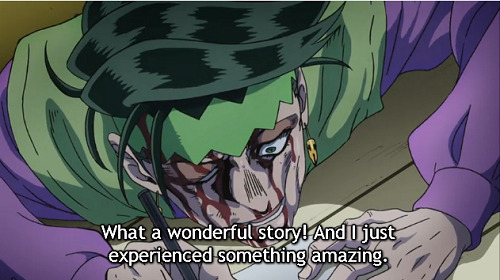


He says he’s happy. I love the slight ambiguity here, too. This is literally like that ‘they’d punch me and I’d say thanks’ meme. Because of Josuke he gets to... experience getting the absolute shit beaten outta him. The fact that he practically squeals in terror mere moments after showing a warped sense of gratitude for the ‘experience,’ is hysterical.

writing college essays be like. ok but honestly this one kinda makes me a little sad because of reasons. It speaks to how desperately Rohan wanted to be able to create stories that people would read. He’s afraid of failure.

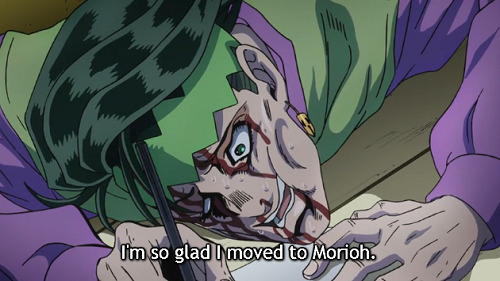
He’s probably more referring to the experience of getting to learn all those cool things about Stand users and being inspired to write for his manga than getting beaten up and crushed by his own bookcase, but it’s still funny. It’s also ironic bcuz out of everyone in DiU, Rohan is probably one of the unluckiest dudes I have ever seen. bruh.... I absolutely love that Rohan is deeply invested emotionally into certain aspects of Josuke’s life, without liking him as a person. I know ppl have joked that Rohan has probably portrayed Josuke-type characters as villains in his manga, but I firmly believe that, whether or not Rohan would admit it, he’s inspired by Josuke’s life to make compelling stories, as well.
So how do we get to the essential roots of Rohan and Josuke’s mutual hatred? I will grant you, Rohan being hospitalized for a month would have given him time to calm down from his obsessed high and start to resent Josuke for hindering his ability to work on his manga via injury and breaking all his stuff. The trade-off is that a whole new world of inspiration opens up to him and also inadvertently leads to Rohan developing his Stand’s abilities further (click here for my meta on the growth of Heaven’s Door). Even though that doesn’t balance out the degree to which he got his ass kicked, I still don’t think the hospitalization is the real reason for their tension, or rather I should say, not all of the reason.
Ultimately, I think that Josuke and Rohan’s personalities simply mix poorly. Josuke is terrible at telling lies and is prone to feeling immensely guilty when he thinks he’s suspected of wrong-doing. Rohan is a highly paranoid, distrustful person by nature and hates being humiliated due to his pridefulness (which... reminds of Kira actually, but that’s another subject entirely). Coupled with the fact that many of Josuke’s ideas tend to go very, very wrong, it’s a recipe for disaster. This is highlighted in their gambling match.
Rohan can sense Josuke is trying to screw him over, and he fixates on it, to a point that he doesn’t even care about his house burning down in the moment. Why? Because Rohan’s pride is at stake. Not only that Josuke heals him even though Rohan was unable to figure out the secret, which damages his pride even further. It’s only following the events of this that Rohan passive-aggressively tells Josuke he’s upset about his stuff getting destroyed.
This is critical groundwork for the Highway Star incident. Josuke is burning with guilt at what he did to Rohan. Josuke is a poor high school student who wishes he had more money, but he certainly didn’t expect or want things to escalate as far as they did. Rohan resents Josuke for the humiliation. I think it's worth noting that Rohan says he was holding back anger towards Josuke for Mr. Joestar’s and Koichi’s sake (not that I feel he did a very good job of it, but he did at least try, the implication being that Rohan has started to show more awareness of others’ feelings, even though he still has difficulty dealing with people socially).
What upsets me is that Rohan is very intent on capturing Kira and worries about potential victims, but Josuke doesn’t realize this about Rohan, who does a lot of behind the scenes work. The last time they really interacted was when Rohan almost killed Josuke’s friends. Aside from that Josuke sees Rohan being a jerk to some random kid (Janken Boy). His attempt to invite Rohan to sit at the table with his friends is interesting given that Josuke openly admits to Joseph a little later that he dislikes Rohan. He’s probably just going through the motions of politeness since he doesn’t look terribly thrilled about asking Rohan to talk with them. Koichi no doubt told the others everything that happened in the Ghost Alley, but even Koichi is like, ‘Don’t trust him too much, he’s pretty sketchy.’
Rohan was desperately trying to warn Josuke about the illusion in the tunnel. He deeply cares about what happens to people. This is evident in Janken Boy, and I think its placement in the story is very important in showing how Rohan’s character has started to really evolve. I will fight you on this. Josuke, who has no reason to trust Rohan and is immensely guilt-ridden about cheating and inadvertently leading to... over 7 million yen in damages to the guy’s house, lashes out at Rohan. There’s mutual distrust going on.
Rohan is angered that a guy who was blatantly humiliating and attempting to rob him would dare to consider him a liar. It’s understandable but so ironic. Rohan is actually a pretty honest person. When it comes to serious situations or his feelings about people, he's almost always upfront to a point of rudeness. Yet it’s this same abrasive personality that makes him seem so untrustworthy to others in DiU. Over and over, Rohan tries to help in his own way and warn the others of danger, but he gets shut down. He still tries anyway.
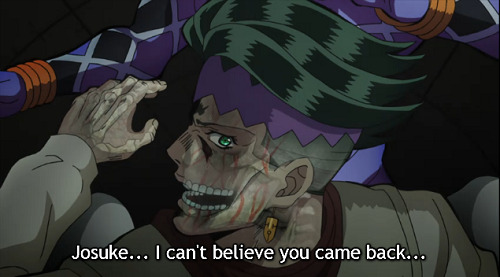
When Rohan is struggling against Highway Star, he’s clearly relieved and shocked Josuke came back. The main difference between this situation and Koichi saving him is that Josuke doesn’t get to see Rohan’s reaction. What I love about Rohan is that, like Josuke, he is not the type who abandons others, even if he doesn’t know or like them. You could call it his sense of pride/ego, or a strong-willed conviction, or an incessant need to be an arrogant dick, but the simple fact is that he refuses to betray Josuke and is fully prepared to die fighting alone. Rohan warns him to stay away, and he’s angry that Josuke fell into the trap because of the stubborn contrariness that Rohan hates so much (I have meta on this, but another time).
Meanwhile this is the first time Josuke has ever witnessed Rohan being a decent human being. He’s so thrown off that Rohan would choose to sacrifice his life, but he vows to save Rohan no matter what. And previously, Josuke has almost always referred to Rohan in a rude form of address (not usually to his face directly but I like that this goes both ways), but that changes in this arc.
The thing that really kills me is, at the end of the day, Josuke genuinely tries to apologize to Rohan. He’s realized that Rohan is more than an asshole. He was telling the truth and sacrificed himself to protect Josuke. Rohan having the social skills of a walnut refuses to let Josuke finish apologizing. I really want Josuke and Rohan to reconcile, but I can also understand that it will take a LOT more for them to be on good terms. I wouldn’t want to just hug it out with a guy whose fool-ass tried to rob and humiliate me, especially when you consider Josuke went to such great lengths to cheat too (though I personally feel like his being able to break into Rohan’s house to switch the dice seems more of a convenient plot device but shh).
I think there’s many reasons why Rohan doesn’t want to hear Josuke’s apology, one being that he doesn’t want to be indebted to Josuke (and he makes it clear he doesn’t consider it as such because he hasn’t forgiven Josuke for all the shitty things he did prior to this incident), because he’s unable to read Josuke’s behavior and has trouble taking kindness at face value, because he’s still bitter that Josuke healed him without his approval from before, etc. However, I think the fact that Rohan calls Josuke an idiot indicates he does care in his own way. Josuke’s refusal to listen put his life in danger, too, and Rohan was trying to prevent that because it would’ve meant they’d both get killed. Rohan does not like Josuke as a person, but he shows concern about him, and the opposite is also true. Much as they try to avoid dealing with each other, they are forced to cooperate by circumstance, and I like that.
#JoJo's Bizarre Adventure#JJBA#Diamond is Unbreakable#DiU#Kishibe Rohan#Josuke#meta#my writing#long post#jojo spoilers#i just love the layers of complexity to their characters#they're both flawed and have legitimate reasons to not trust or like each other#incidentally based on some of the one shots i do believe they slowly get on better terms#fyi i have only watched up to part 4 and am reading the manga as English releases come out#so no spoilers but i hope I get to see them have more interactions later on#i did post about this but i think it's kinda charming that Josuke is all 'let's go see Rohan in prison' at the end#i have many other thoughts but i think this post is long enough for now
3 notes
·
View notes
Text
Building a Lean Team: Part II
A functioning team is the essential foundation of success. Guido Schmidt from Digamore tells us in the second part, how to improve the work process and goes deeper into the topic SCUM.
Check out the first part of Building a Lean Team:
Building a Lean Team: Part I
Improving the work process
We set up the whole work process, team culture requirements and game vision structure in the best and most reasonable way we could. But of course, no plan survives reality unchanged. That’s why we also put a lot of emphasis on observing and improving our work process. It wasn’t enough to just set up and use SCRUM, we wanted the team to
Visualization of the three pillars of a lean team:
work climate, ownership and work processes.
eventually own and shape the process on its own. For that we intentionally reserved two whole days per 2-week sprint. One day for planning and one day for reviews and retrospectives. Maybe it seemed like a huge waste of time initially, which was also the first feedback we got from the team. Why not use this time to pull off additional work? A good question that deserves a good answer.
First off, we know that implementing a new work process always requires a lot of time and effort. Everyone wants change but nobody wants to change.
So we said that we intentionally invest this time into making this process work and that we are aware that it means we have less time to do actual work – and that’s ok.
Second, we need this time to prepare our plan for the next sprint. We invest one whole day to make sure we can work for the remaining two weeks without having to re-adjust constantly. The main idea was to create two weeks of quiet, during which people can get stuff done without being constantly interrupted.
Third, we invest another day to reflect on how the last two weeks worked out. It is a timeframe that is short enough for people to not forget the problems they had. And by allowing ourselves the time to sit back one day and reflect, we can make improvements to the way we work.
Clearly defining all areas of responsibility for everyone helps the team immensely in growing trust.
In a retrospective, people can bring forward topics they want to improve. The members of the team are the best people to ask this since they are the ones doing the actual work and having the actual problems. Of course, we also highlight things which went well. If you have to discuss uncomfortable issues, it is especially important to also be aware of the good things that happened within the last two weeks in order to avoid communicating an impression that things are worse than they really are. The most important part of the retrospective, however, are the real issues. The stuff that really annoys the team. Things that demotivate – things that cost an extraordinary amount of time, frustrating behavior of managers, unfair blaming of people and other uncomfortable circumstances.
However, by putting such a great emphasis on a positive and constructive team culture, we were always able to keep difficult discussions at an objective level. We were able to talk about things which annoyed us very calmly and we eventually resolved these problems by fostering understanding on all involved parties. Every team will have their share of issues, problems and personal annoyances. This is normal and every team will face these issues. The difference between a good and a bad team is how they deal with them.
At the end of each retrospective we put together a set of actions that we were going to try out to improve things. In the following retrospective, we then re-evaluated these actions to see whether they did improve anything. If they did, we kept them. If not, we dropped them and tried something else.
How did it work out?
Brace yourselves – winter is coming! And with it a lot of discussions about a lot of very very basic things. When we started working with SCRUM (note: an agile software development framework for managing product development) it was new to all of us. None of us had worked with SCRUM before, so we hired an external consulting company to help us implement it in our process correctly. These guys also helped us with understanding the meaning behind certain agile concepts, why they made sense and what it was that people benefited from. Some of the things we spent hours and hours talking about them:
1. What are the team’s benefits from using SCRUM at all?
– Isn’t it a huge waste of time?
2. Why are we using »story points« and not just a time estimation just as »normal« people do?
– And if we are using story points, what the hell is this »complexity«?
3. What’s the exact granularity of our stories per feature?
– Is it ok to just say »League User Interface« (like one story per feature)?
– Should we make a story for each screen of the League Interface (four to five user stories)?
– Or should we create a story for each interface element with all their behaviors and states (more like 30+ user stories)?
4. Aside from this, we also had fights and troubles concerning coding architecture, art-style or which features were still within the vision and which weren’t. We had a huge scope on our plate and from time to time underestimated the effort it took to get certain features implemented, which led to fights about what features to push back and what should be achieved in certain milestones.
Basically, we went through all the insanity of game development you can expect in every company and project. Every team will face these problems. Accepting that teams will have these issues and knowing how to handle them is key. There is no perfect project out there, where everything runs smoothly from start to finish. Projects are messy. And projects change during development, as does the market and its requirements.
People leave, new people join, but the world continues to turn. In today’s fast paced society, it’s even almost impossible to take reliable predictions two or three years into the future. Who can say what revolution is waiting around the corner, which will make your key USP totally worthless half way into your current project. And if it happens, do you continue with your original plan or would it be better to adjust? And if the answer is yes, how would you do that exactly?
Game development is full of tough questions and hard calls, which is also why the retrospective is the most important meeting in our whole development process in order to be able to adapt to the »unknown unknowns«. Thanks to our mature discussion culture and ability to talk about uncomfortable topics, we were able to greatly improve the efficiency of our work process.
When we started with planning meetings at the start of a sprint, they tended to last seven hours or longer. Those were extremely exhausting days, full of uncertainties, questions and unclear requirements of what we wanted to achieve over the next two weeks, but we stuck to it. During every retrospective, we not only identified the three worst problems, but also found ways to improve these long and exhausting meetings. We had to go a long way, but in doing so our meetings became very reliable and humane. It now rarely takes us more than 1.5 hours to complete our plan for the next 14 days. So yes, it is possible to improve the efficiency of your work process by up to 80 percent and more!
What are the team’s benefits from using SCRUM at all?
Especially in the beginning of the production process, people were wondering why we would use SCRUM at all. How does the team benefit from it and why would we »waste« two (!) days every bi-weekly sprint sitting around and talking?
The very first step to get everyone on board was to acknowledge that it does take time to get a new work process implemented and that the management is willing to invest this time. It meant that we accepted that implementing new features would take longer in the first couple of months!
An early draft of »Football Empire«’s »start a match screen«.
Just accepting and acknowledging this fact took a huge amount of pressure off us, since we made clear that we did not expect the team to implement a new and unknown process and push for a super-fast implementation of new things at the same time. When people are trying to adapt to new processes, it takes time to get everything in place properly. In addition, we spoke about the process and what we expected from it – for ourselves and for the team.
1. By using SCRUM, we ultimately expected a more accurate time estimation
– Measuring how many story points the team would be able to complete every two weeks would eventually allow a reliable forecast of how much work the team could pull off in reality, including all the disruptions, discussions, ambiguities and hidden efforts.
2. A more reliable project plan
– A more reliable plan meant better-quality planning. It was a lot easier to push estimated features back and forth and tell whether a feature would fit into the next milestone or not. Of course, we wanted to push as much stuff as possible into each new build, but when the numbers said that it was going to be a problem, we could adjust early enough to rather focus on the most important features.
3. Transparency
– We always made all efforts, plans and estimations publicly. We showed the current state to our team and discussed our plans and whether the team felt it was realistic or not. In several cases, we also changed the contents of certain milestones to what the team felt was more useful or easier to implement.
Players can individualize their club grounds with way more than 20 different buildings.
4. Less overtime
– More accurate planning will lead to more reasonable milestones which again will prevent nasty surprises. And avoiding those will prevent people from having to do overtime to get forgotten things into the next milestone.
Why are we using story points?
Estimating story points means to not just estimate »how long something takes to implement« but to determine the rough complexity of a given task. Of course, in the end, we want to re-interpret story points back to a time estimation – that’s the whole point of it. Doing it via story points will in fact improve the quality of the time estimation. Let’s say two programmers are to estimate how long a specific task will take them to implement. Programmer Lenny says he can do it in one day, while Carl argues he would probably need around five days to do the same. In this case a time estimation with regard to the whole team is very inaccurate. Both guys, however, can agree on a rough complexity rating for the task.
It’s just that Lenny can do the same thing a lot faster than Carl. Nevertheless, Lenny can’t do everything alone and Carl has other areas of expertise. What we want is an accurate estimation of what the whole team and not only individual members can achieve. When both guys agree on the complexity of a story, they can eventually agree on a reasonable amount of story points for the task at hand. Our definition of complexity includes the following aspects:
1. Amount of expected iterations
– This aspect applies for tasks that encompass a lot of quick iterations, e.g. on how a specific window should scroll. Should it snap at certain key elements? And with how much inertia should it scroll? In this case, it makes sense to just implement something, try it out, adjust it, try it out again, etc …
Tasks like this are more complex than tasks with clear and easy requirements.
2. Scope of the task
– The sheer scope of a task contributes to its complexity. If a task requires to touch all 200 items in the game manually, it is more complex than if it requires to just touch the last 10.
3. Communication effort
– If a task can be completed without having to bother the other departments, it is less complex than if it is a task where coders, designers and artists have to synchronize in order to finalize it.
4. Testing effort
– If a task uses randomization, it is more complex than if it doesn’t. That applies to all tasks that need several test-runs before their implementation can be finished.
5. Amount of different technologies used
– Every technology used contributes to complexity. If a task is to just create an icon, it is less complex than the task of creating a user interface which not only uses icons, but also sounds and that has to function on an Android and an iOS device.
6.Dependencies
– The more dependencies, the higher a task’s complexity. If a task only touches the frontend alone, it is less complex than if the backend has to provide specific data before the frontend can show it.
With all of these aspects elaborated, the team eventually settled on a magnitude of how many storypoints each task was worth. That allowed us to greatly improve the quality of our planning forecasts.
What’s the granularity of our user stories?
We were experimenting with various granularities. We wrote stories which were very big in the beginning and almost encompassed whole features. This method brought several disadvantages with it since we could not always complete a whole feature in one sprint, which meant that these stories could also not be completed.
Working places at Digamore are positioned in a way
that makes it easy for people to turn around
and talk to each other.
After that we went into the opposite direction and created stories which were extremely small and detailed, even going so far as to have a story for each interface element. Which, on one side, was a good indicator for what had been achieved. On the other side, it created a lot of dependencies between stories, which made the whole point somewhat useless. Plus, the overhead on the management team exploded and it was very difficult to keep up with the team. In this scenario, people were implementing things faster than we could design and document them.
Eventually we settled in the middle. Stories were basically written »screen by screen«, while the interface elements were described on the according wiki page.
Summary
So, in the end and in my opinion, there are three main points you should adhere to when creating a good team and – as a direct result – a good product:
1. Ensure a good work climate.
– Make it a topic.
– Emphasize it.
– A good work climate and team culture is the basis of everything that comes after. Get it right from the beginning because otherwise there is no point in trying to build anything on top as nothing will work out properly.
2. Create a framework of clear responsibilities which your team can eventually outgrow.
– Provide a safe environment for people where everyone can voice their concerns and where it’s clear who has which responsibilities and who has to make the call.
– Be rigid at the beginning.
– Be flexible when the team is ready for it.
3. Improve the process (the »retrospective« within the SCRUM process).
– Ensure that the management is behind this approach. There’s no point in trying to improve things when the management is not willing to invest time into doing so.
– Regularly reflect about how everyone did and what the most pressing issues are.
– Don’t try to fix everything at once. Take the three worst issues and fix those, then take the next three issues and so forth.
– Ensure that the time-frame between taking action and reviewing it is short enough. Otherwise people will forget what they have agreed upon.
About the Author:
Guido Schmidt
is Project Lead at Digamore Entertainment GmbH
Guido is an industry veteran with more than 15 years of experience. He worked on the »Anno« and »The Settlers« franchise (e.g. »Anno 1404« and »The Settlers Online«) and is now responsible for the upcoming Football Empire.
@LinkedIn
The post Building a Lean Team: Part II appeared first on Making Games.
Building a Lean Team: Part II published first on https://thetruthspypage.tumblr.com/
0 notes